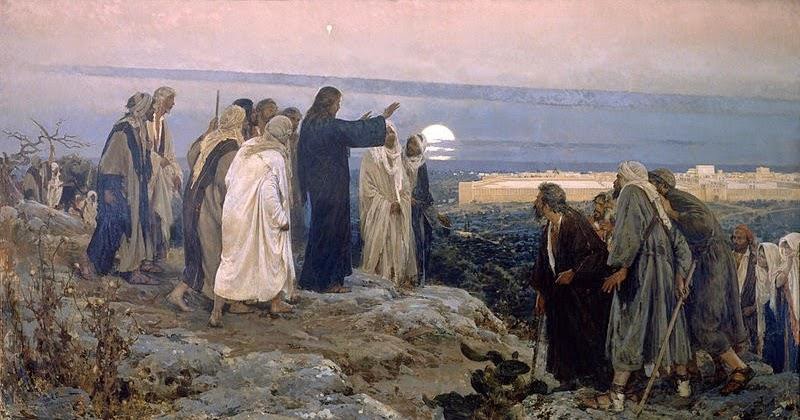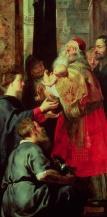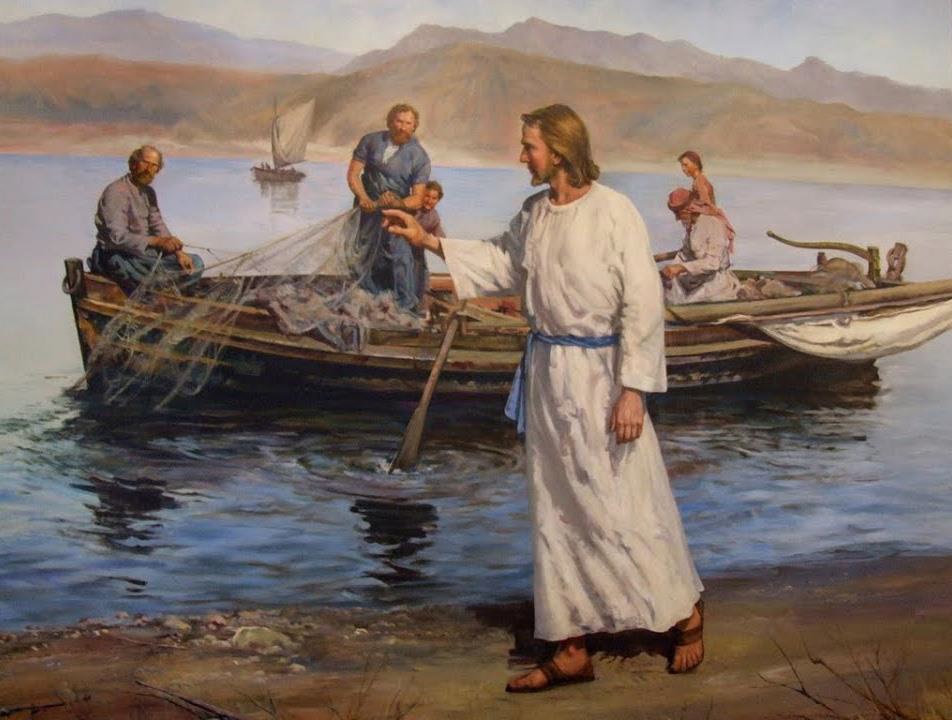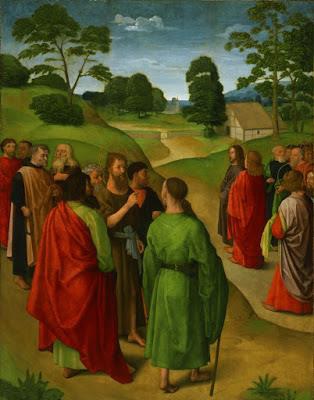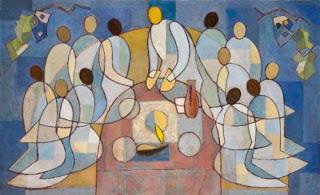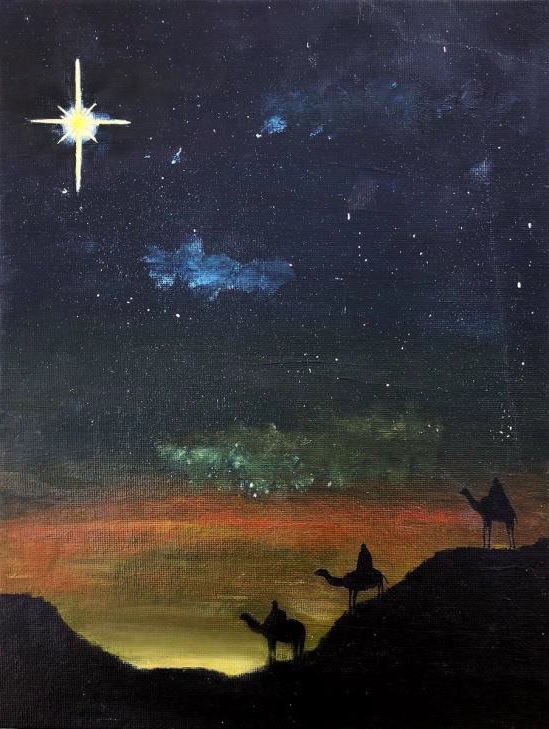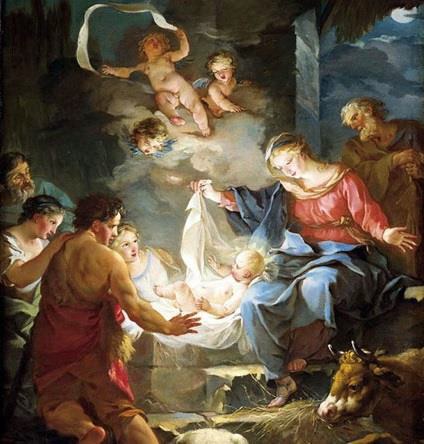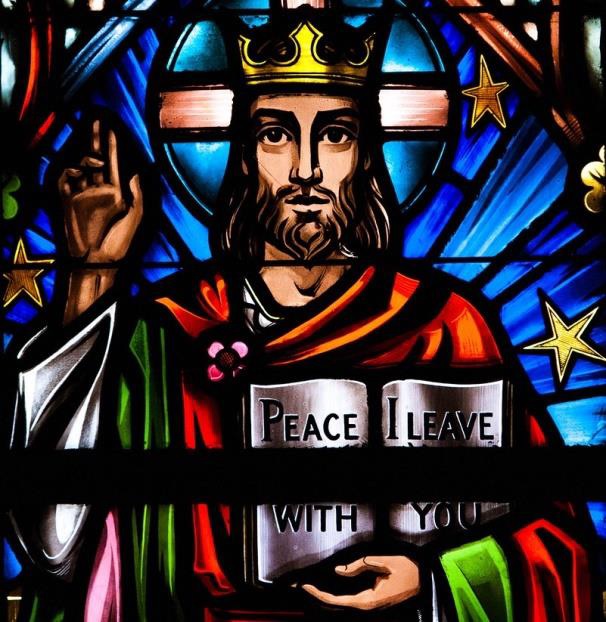|
|

Emmanuel—God with Us
This Sunday and Beyond - December 27, 2020
Get it in PDF form with calendar
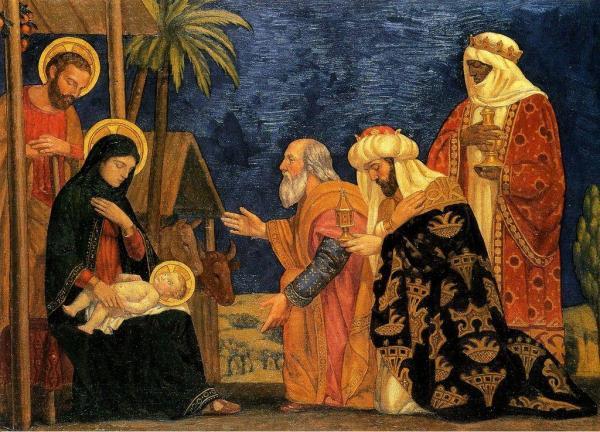
Christmas is the Season that proclaims the salvific mystery of God’s incarnation. God made flesh. God born into this world as a baby boy.
He who created all that is, He who cannot be known or even conceived by the human mind, He who transcends all human or superhuman concepts, has now come to live with humankind, not as a superhero, not as a Greek demi-god, but as a real human being, subject to all the limitations of human nature. It is God’s self-emptying. He whose Glory surpasses all we could ever conceive, has come down to earth in human flesh.
And what could be the purpose of God’s self-emptying and incarnation?
Could it be God’s curiosity or need to experience what we human beings feel throughout our mortal lives? If we believe in an omniscient God, then the thought that there is anything about our lives that He does not know is inconceivable. But there is clearly a purpose in incarnation, and it has to do with God’s unconditional love for us all.
Throughout the history of Israel, God manifested Himself mainly as God for us. He carried out wondrous deeds of salvation for the Israelites, delivering them from the hands of their enemies and leading them through His prophets to the right way of living. He gave them commandments so that their lives could be in a more harmonious relationship with their God, with one another and the whole of Creation. But the people always thought of God as a transcendent being, one that took care of their needs but was always beyond their reach.
Eventually, prophets like Isaiah began to glimpse a time when God would not only do wondrous deeds of salvation for His people, but would come to live among them, in their midst, and he called this child to be born Emmanuel, which means God with us. He was probably thinking about a king who would carry out God’s will with so much faithfulness that he would practically make God’s presence be felt among His people. New Testament writers later interpreted this as a reference to Jesus Christ Himself.
The coming of God the Son to this world happened at the place and time that God saw fit. New Testament writers call it in the fullness of time. He inaugurated a new era for this world. He made God’s unconditional love for us and all of Creation tangible as never before. He showed us His Way of Love in His own human person and prepared His followers to carry out the salvific reconciliatory mission throughout the times, until God can become all in all.
God’s incarnation has nothing to do with any merits of ours. The world where He incarnated was not neat and righteous. Just as it is today, it was a world full of mess, confusion, and conflict. It was out of sheer grace that God became Emmanuel, not to please Himself in a world of solace, but to share His self-giving love with us all, and He relentlessly continues to do so till this very day.
Fr. Carlos Expósito, Rector
|
RETURN TO TOP
Preparing Christ's Dwelling Place within Us
This Sunday and Beyond - December 20, 2020
Get it in PDF form with calendar
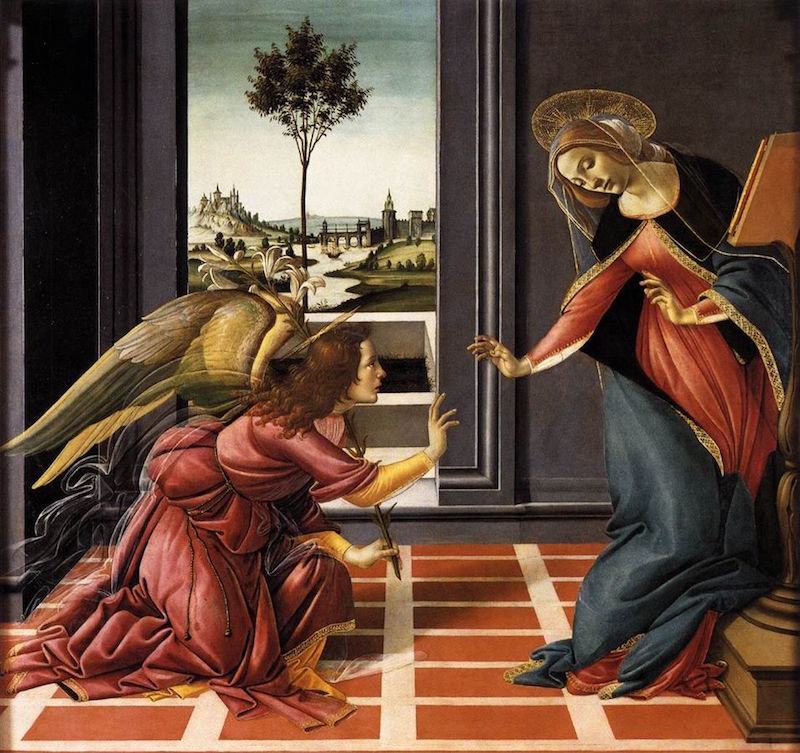
The Collect for this Fourth Sunday of Advent urges us to purify our conscience ‘that your Son Jesus Christ, at his coming, may find in us a mansion prepared for himself’.
The thought that comes to our mind when we speak of a mansion is a lavish home with fine premises and decorations. It may have been the intention of the person writing this prayer to stress the fact that our God deserves the absolute best inside us to be offered to Him as His dwelling place within us. Even so, the Old Testament shows us that God’s preferred dwelling place was a moving tent, and Jesus clearly stated that ‘the son of man had no place to recline his head’.
It was only later in the history of Israel that a magnificent temple was built as a symbol of God’s presence, but the prophets and Jesus himself had a clear notion that God did not need a fixed building as a dwelling place, since the whole world is His.
Our God has no needs. It is us who have a constant need of Him, and He is always trying to find the way to dwell with us, because His love for us is greater than our human understanding.
When God approached Mary through Gabriel to make the mystery of His incarnation possible, He was clearly not looking for a woman of high social standing or prestige. God was looking for a tent where He would be welcomed, where the encounter between the human and the divine would take place in the humblest of ways, with total acceptance.
The angel’s greeting to Mary is clear: God is with you! He does not refer to a future event, but to an ever-present reality. God is always with each of us. It is us who often try to run away from Him. God is certainly not looking for “mansions” in an earthly sense to make a dwelling with us. He is always inviting us to open the tents of our hearts to His constant presence, so that He can be on the move with us, and guide us all along the way, as He did with the Israelites in the desert.
The initiative is always His, but we need to make room for Him in the tents of our lives. A clean, roomy, and open tent will do. The mystery of His incarnation was made possible thanks to God’s self-emptying with the cooperation of a young maiden with a total willingness to obey His will for her. But His incarnation is a continuing and ever-present reality in each of us now. He wants to keep on living with us, among us, in us. Let us do our part by cleaning, making room and opening wide for Him the tents of our lives.
Fr. Carlos Expósito, Rector
|
RETURN TO TOP
Rejoice always!
This Sunday and Beyond - December 13, 2020
Get it in PDF form with calendar

In the First Letter of St. Paul to the Thessalonians—the document that several scholars agree was the first New Testament writing—he urges them to rejoice always, to pray without ceasing and to give thanks in all circumstances. And the reason for this requirement is clear: “this is the will of God in Christ Jesus for you.”
The Third Sunday in Advent is known as Gaudete Sunday, a Latin word that means rejoice, precisely because the words of the introit in the Roman mass are taken from this Epistle of Saint Paul to the Thessalonians, beginning with the word Rejoice. The color for this Sunday is rose, and flowers are used at the altar. It is like a break in the more solemn tone of Advent, giving way to the deep feeling of true joy that the certitude of this hopeful wait brings us amid our tribulations and uncertainties.
Our modern world is full of lures that push us towards the attainment of material satisfactions. The level of sophistication of these attractions has risen considerably in the last decades. The ones that have better financial means can attain more of these, and so life centers in competing with one another for better gains. But the fact is that there is a never-ending vicious circle of wanting more. And no true joy is ever achieved.
Talking about rejoicing in our present situation may sound like an irony. There has been and there is still a lot of suffering this year. However, it is not hard to imagine that the recipients of Paul’s letter were not in a much more favorable situation. These were new converts. People who had given up their pagan religion and embraced the faith of Jesus’ Way of Love. But this had a cost. It severed their bonds with their well-established communities, even with family members. It brought them conflict and suffering — even persecution.
Only constant prayer and a deep feeling of thankfulness for the peace and grace that their unshakable faith in Christ’s redeeming power brought them, could keep them going. And this great faith is always expressed in authentic joy. But this is a joy to be shared. Losing the bonds of their previous pagan worship had to be replaced by the strong bonds of the Christian church, the holy assembly. That is why Paul commands them to greet all the brothers and sisters with a holy kiss and to read the letter to all of them.
Today we Christians also need to pray unceasingly, and give thanks to God in all circumstances, because our true joy does not come from passing favorable conditions, but from the deep conviction that our God is a loving God, the God that gave Himself for us so that we can have an abundance of selfless eternal life shared with all. And we need to stand together, encourage one another, share and multiply this authentic joy, and shout it from the top of the mountains if need be: Rejoice, always rejoice!
Fr. Carlos Expósito, Rector
|
RETURN TO TOP
Living in the Hope of Renewal
This Sunday and Beyond - December 6, 2020
Get it in PDF form with calendar

According to scholars, the Second Letter attributed to the Apostle Peter was probably written by someone appealing to Petrine authority after the year 125 A.D. It is commonly thought to be the last New Testament document.
At that time, there were those who no longer believed in Christ’s second coming and emphasized the “already” at the expense of the “not yet”. But in his letter the writer wants to make clear that even though it may take longer than expected, this glorious coming of our Savior, with the passing out of the old and the consummation of the new creation, is an integral part of our Christian faith.
The writer of 2 Peter is convinced that what some see as the Lord’s tardiness is due to His willingness to enable all to repent and be saved, because His all-encompassing loving nature would not want anyone to be lost.
He admonishes all the faithful to live every day in hopeful expectation of the coming of this new creation, keeping the faith and doing the loving works God expects us to do, so as to grow in the grace and knowledge of our Lord, whose glory is both for now and for the coming new creation.
This message is as valid and relevant to us today as it was when it was written. As we prepare for the coming of our Savior into our lives during this Advent Season, we should not forget that, as Christians, our ultimate hope is a renewed creation, one in which, like the psalmist says in this Sunday’s psalm, “Mercy and truth have met together; righteousness and peace have kissed each other”.
Our watch-keeping then, is not to be a passive one. We should strive towards the coming of this new creation. We should work towards it. We should make it happen. Our help in making this possible, though, is not in our own strength, as we may be misled to think. Our only help is in the Lord.
Praying and working together, led by the Holy Spirit, and united as the different and unique members of Christ’s Body, the Church Universal, we will live our personal and communal lives as if it were always Advent, always hopefully expecting, and always ready to be transformed into His ever-renewing creation.
Fr. Carlos Expósito, Rector
|
RETURN TO TOP
No Idle Wait
This Sunday and Beyond - November 29, 2020
Get it in PDF form with calendar

Advent is said to be the time of hopeful wait. The Word Advent itself is derived from a Latin root meaning coming. It is a time of getting ready for He that is coming to our lives.
It can be looked at from three different perspectives.
A past or historical perspective: Advent is seen as the preparation for the celebration of Christmas, the great mystery of God’s incarnation on earth in the baby Jesus. From this perspective, we prepare our hearts and minds to celebrate this wonderful mystery once more in our lives, and to reflect on its significance for our lives and the life of the world.
A present perspective: Advent is seen as a way to prepare ourselves for a new beginning, a new way of being that is a better reflection of God’s image in our lives. In this sense, we prepare ourselves through the reading of Scripture, meditation and prayer, with the help of the Holy Spirit, to let Christ be born in our lives and take hold of them, be our guide and ruler.
A future perspective: Advent is seen as a time of preparation for the accomplishment of God’s will in this world. We get ready for the end of times, so to speak, even when we have no notion of when it will take place. We carry on our lives in the present with the sure hope of our glorious, resurrected life in the future. To this end, aided by the Holy Spirit, we do our best to follow Jesus’ Way of Love at all times, spurned by the hope of a new wonderful world that not even in our dreams we can get a glimpse of.
It is not hard to realize that these three perspectives are inextricably intertwined and even though our focus can be one of the three at a given moment, the Advent Season considers the three of them at the same level of relevance. The first week of Advent this year, for instance, focuses on the future perspective or the end times.
Whichever the focus may be, however, one thing is always clear. As Christians we are called to live in God’s eternal Advent, because our lives are always about what we hope for with certainty, even though it is not still present. Such is the genuine Christian hope. And the wait needs to be fruitful, filled with loving activity.
It is as if we were awaiting the most extraordinary guest into the homes of our lives. We need to get rid of the clutter, the dirt, the useless stuff, and clean up and adorn, and make adequate space for our favorite guest to stay. No time to be idle. There is a lot to be done while we hopefully and prayerfully wait.
Fr. Carlos Expósito, Rector
|
RETURN TO TOP
That God May Be All in All
This Sunday and Beyond - November 22, 2020
Get it in PDF form with calendar
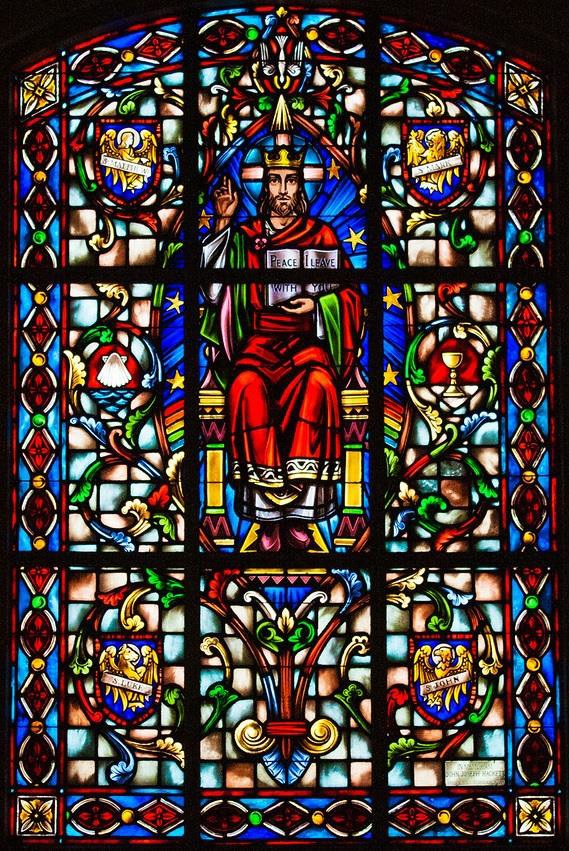
This coming Sunday the Church celebrates the closing of the ecclesiastical calendar with the Feast of Christ the King. This is the recognition of Christ’s sovereignty in our lives, as His faithful followers, as doers of His will. And it is also the acknowledgement that the Church is in the world for His loving reconciling mission only, and not of itself, or for itself.
Even the King of Kings and Lord of Lords, Christ our Savior and Redeemer, has an ultimate reconciling mission to accomplish, after which, according to St. Paul in his First Letter to the Corinthians, He “will put all things in subjection under Him, so that God may be all in all. So the Second Person of the Holy Trinity does not ultimately point to Himself, but to the Father, from whom He proceeds.
Kingdom and Lordship are terms that normally remind us of subjection of a great number of people to a person’s will, in a totally autocratic way, that usually implies great privileges for the one exerting such power and great disadvantages—usually injustice-- for the subjected ones.
Christ’s kingship, however, is seen in a totally different light. When we read about His life and ministry in the Gospels, we see a man with such a sense of commitment to love for His fellow human beings, and for all creatures, that we cannot but wonder how so much love can be irradiated by a person, unless this person is the incarnation of God’s very love on earth.
Jesus Christ our Lord was always clear in His words about the source and goal of His mission. He always pointed to His Father, whom He also called the Father of all His followers. And He made it clear that the goal was “that they may be all one: even as you, Father, are in me, and I in you, that they also may be in us, so that the world may believe that you have sent me.
Jesus’ Kingdom is certainly not of this world. It is so different from all human kingdoms or governments! It is a kingdom of meekness, of self-giving in total sacrifice, of selfless love and of ultimate deliverance of all power to the one source of life and love, so that in the end, we can all share in that abundant life that surpasses all human expectations and desires.
Let us then declare with unwavering certitude and utmost joy: Christ is King of Kings and Lord of Lords!
Fr. Carlos Expósito, Rector
|
RETURN TO TOP
Living in the Day of the Lord
This Sunday and Beyond - November 15, 2020
Get it in PDF form with calendar
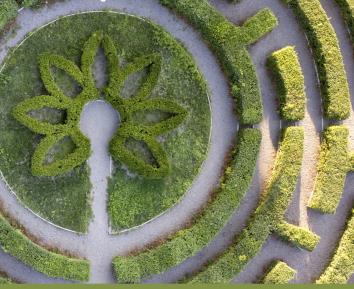
In his First Letter to the Thessalonians, Chapter 5, the Apostle Paul writes about the day of the Lord to Christ’s followers in this church. The Hebrew Scriptures often speak about the day of the Lord as a day of judgment and fulfillment of God’s will on earth, and several prophets refer to it as a terrible day of destruction and death, when the wicked will find that no measure of material riches will save them from God’s consuming wrath.
Paul makes reference to this day, and relates it to a second coming of Christ, which biblical scholars agree that he expected would happen soon, but Paul makes a clear contrast between the fate of those who are in darkness and Christ’s faithful followers as the children of light.
Paul is certain that the children of light, those who persevere in Christ’s faith, even amid great tribulations and the danger of losing their lives, and courageously put into practice His Way of Love; those whose sure hope is salvation thanks to Christ’s self-giving on the Cross, will have a glorious destiny: the joy of sharing in Christ’s very life, a love-filled life lived in communion with our Creator, our fellow human beings, and the whole of creation.
He also makes it clear that those who have died in this faith will share this glorious destiny with the faithful who are still living when this day of the Lord comes.
As for the moment when this is expected to happen, however, Paul gives no clue to the Thessalonian Christians. He simply says, “you do not need to have anything written to you. For you yourselves know very well that the day of the Lord will come like a thief in the night.” Here he follows what is written in the Gospels about what Jesus Himself declared in relation to this day.
It is true that Paul hoped for this day to come soon, even in his lifetime, although he may have changed his views in this respect when it did not happen. But the fact is that in his letter to the Thessalonians he does not encourage them to focus on the future time or day of this event, but on the strength of their faith, on their loving deeds, on their sure hope. In other words, he is encouraging them to live each day as if it were the day of the Lord.
Despite his convictions about the imminent coming of the day of the Lord, Paul’s encouragement to the Thessalonian Christians was as valid then as it is today for us. We may or may not be awaiting a coming of this day soon in our present lives, but what really matters is the way we live each day of our lives.
If we choose to live in Christ’s faith, practicing His Way of Love and courageously hoping for a better life for ourselves and the others by persevering in our faith in the transforming power of Christ’s self-giving love, then we will have chosen to live in the day of the Lord rather than await for its coming on a distant future date. Then our lives will certainly reflect His loving life, and our light will shine for others to follow the path of salvation in God’s time, which is always now.
Fr. Carlos Expósito, Rector
|
RETURN TO TOP
Oil for Our Lamps
This Sunday and Beyond - November 8, 2020
Get it in PDF form with calendar

The parable of the ten bridesmaids was used by Jesus as one of His images of God’s Kingdom. But parables are not supposed to be explicitly descriptive of the transcendent truths they point to. They are situations taken from everyday life, scenes that the people of Jesus’ time were familiar with, pointing to a reality that went farther and beyond, challenging the listeners to “hear” the true message that was intended through the narrative.
There is symbology in parables, of course, but we should not assume that every character and every incident is to be taken as a symbol of some doctrinal truth. The narrative is just a general setting where people interact, and some results ensue. The final words are usually the pointer to the main message.
In this parable five of the bridesmaids waiting for the delaying groom are called wise, and five are called foolish. This designation is based on the fact that five of them took oil in flasks to refill the lamps while the others took none. So, when the groom finally comes after midnight, the lamps without oil do not burn, and the foolish bridesmaid ask the others to share the oil. But they reply that if they do so, there will be enough for none of them, so they suggest they go to the dealers to buy it.
In the end, the wise bridesmaids are admitted into the banquet, but the foolish ones, who come late, are left out.
The final words in the parable are an exhortation to keep awake, for the day or the hour is not known.
Taken in a literal sense, we may feel there was selfishness in the wise bridesmaids’ decision not to share the oil. But what if the real sense is that this oil represents something that cannot be provided to us by others, something that we can only get ourselves? The oil is the fuel for the light in the lamp. What can be the fuel of our inner light, the one that dispels the darkness in our own lives and the lives of those who surround us; the light that will guide us to sharing in God’s loving presence?
A life lived prayerfully, firmly based on God’s wisdom found in His Word and the discernment of that Word through tradition and reason; a life lived in justice and righteousness, in loving care of others, nourished by the sacraments and communion with our brothers and sisters in the faith; such a life is the best oil for our inner lamps.
The groom in the parable leaves the foolish bridesmaids out, claiming not to know them. If we assume that the groom represents Christ, then we may feel that He will leave us out if we are not wise enough to keep our lamps burning in time. But where in the Gospels do we see Jesus leaving anyone out? On the contrary, He always encouraged everyone to come to Him, even those whom society considered outcasts and undesirable people.
This may be a way of urging us to be on the alert, to be always ready to follow on His loving steps, to keep our light shining and to not let it be put out by lack of spiritual fuel in our lives.
Let us make sure we always have the needed oil provision to light up our lamps whenever He calls us to follow Him in His Way of Love.
Fr. Carlos Expósito, Rector
|
RETURN TO TOP
Washing Our Robes in the Lamb’s Blood
This Sunday and Beyond - November 1, 2020
Get it in PDF form with calendar
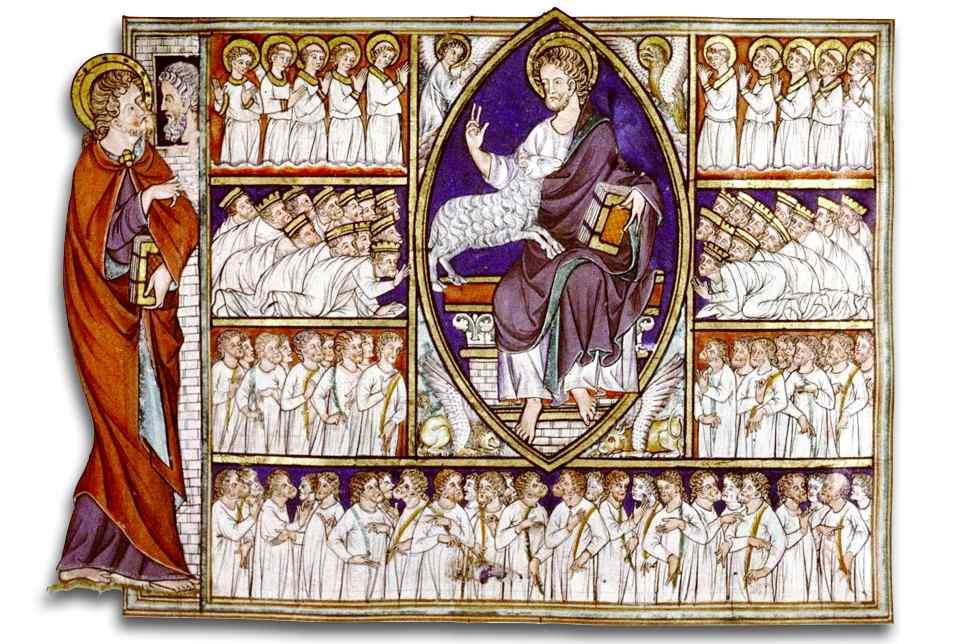
All Saints’ Day, the celebration for this coming Sunday and coincidentally the Patronal Feast of this church, is dedicated to all those who, throughout the history of Christianity, have turned their lives into paradigms, examples for all Christians to be followed, as consistent followers of Him who gave His own life for our salvation. Many of these Saints are martyrs--people who literally gave their own lives faithfully to the Christian cause. Some did not die for Christ, but generously gave their time and energy, even to the point of exhaustion, to carry out the salvific mission they felt they had been assigned by Our Lord.
The Book of Revelation, the last book of The Holy Bible, depicts the fulfilment of God’s salvation for all. The language used in this Apocalyptic genre is full of rich images and symbols, some of which are hard to interpret for contemporary readers, because their immediate referents may have been lost in time. Even so, the richness of this symbolic language is the appropriate way to depict what goes beyond human understanding. It is the poor and limited human mind trying to grasp the divine. The selected readings for All Saints’ Day include a section of Chapter 7 from this book as one of the alternatives.
This book was written in a time of great tribulation and persecution for the newly formed Christian communities within the Roman Empire. The Christian Church at that time was mainly an underground movement, rejected by both Orthodox Jews and Pagans, and seen as a dangerous religion by most emperors because it strictly forbade worship of the Emperor or any other god—they were to only worship the true living God.
Approached in this light, we can then understand the strong and harsh images used against the persecutors and killers, and the need to offer promises of great hope and consolation to the faithful ones.
Chapter 7 presents us with the image of an uncountable multitude of people from all nations, tribes and tongues, clothed in white robes, as a symbol of purification; they carry palm branches—a symbol of victory—and praise God and His Lamb. After a dialogue that serves to identify who these people are, we learn they are the ones who have come out of the great tribulation and have washed their robes white in the blood of the Lamb. As a result, they are in God’s constant presence, serving Him, being sheltered by Him, and being guided by the Lamb to springs of living water. They will suffer no more.
Despite all the dreadful associations that the Book of Revelation or Apocalypse usually evokes, these images speak about the inclusion and universality of God’s saving plan for humanity, and about how the ones who take part in God’s Reign of Love, are not those who were born perfect, but those who go through great tribulations for persevering in their faithful ministry, and who are perfected thanks to Christ’s self-giving sacrifice, which at the same time calls us to give ourselves in sacrifice for fulfilling God’s loving will.
Those are the Saints, and all of us Christians are saints, separated and chosen by God for His great loving purpose. Our great aspiration should be to change the lower-case “s” for the capital one, not for the sake of vainglory, but to be better able to carry out His all-inclusive loving plan now and throughout eternity, in victory and joy, in harmony, in peace and communion with one another and with Him that strengthens us in all good intentions and deeds.
Fr. Carlos Expósito, Rector
|
RETURN TO TOP
Do We Practice Love?
This Sunday and Beyond - October 25, 2020
Get it in PDF form with calendar

In modern times social media is overloaded with the word love, images that evoke love, quotes from different leaders about love. Emojis representing love and loving feelings are found in almost every friendly text or email. It should be a sign that we live in world where love prevails. But is that really the case?
Our common interpretation of love as a warm and fond feeling may lead us to think that there is enough love in our lives and in other people’s lives, but what is the sound biblical concept of love? What do the Law and the Prophets refer to when they talk about love of God and love of our neighbor? And what did Jesus and the Apostles mean by this?
In the Hebrew Scriptures we find clear references to the love of God as the primary obligation of every good Jew. The Shema or recitation of the faith that was passed from one generation to the next, and was usually written on people’s foreheads and over the doors of houses, clearly stated the obligation to “love the Lord your God with all your heart, all your soul, all your mind and all your strength”. In other words, true believers should profess this love of God with every part of their being.
How was this love practiced? Simply by following God’s commands and making them part of one’s daily life. There was nothing about warmth or fondness here.
The Hebrew Scriptures also tell about God’s great love for His Creation, including humankind. This love is translated into the goodness of nature in providing all creatures with what they need, and the justice and compassion that God shows to His people.
The Scriptures also deal with the love that we are to show our neighbors, not only those of the same nation, but also to the alien, the dispossessed and the widow. The rule is to love our neighbors as we love ourselves, and this love is to be shown in practical deeds of mercy and justice. The Prophets condemned the rulers’ injustice and indifference to the suffering strata of society and related the evils that came to the Jews as God’s punishment for this lack of real love.
Jesus was a Jew and as such His notion of love is well founded in the Hebrew tradition. The New Testament uses the Greek word Agape to refer to this kind of love which is translated into concrete acts of compassion, justice, and mercy for all, including our enemies or those we may dislike. The love that Jesus referred to went beyond what could be expected in the Hebrew tradition though. He proposed a love that includes giving yourself, your own life, for the life of the others. He not only proposed it but exemplified it with His own life. He incarnated God’s loving life in His own in the perfect way, thus becoming His perfect image on earth.
As followers of Christ, the incarnation of God’s all-inclusive love, if we call Jesus our Lord, then His love for all must actually be the compass of our own lives, not so much a warm or fond feeling (although the practice of real and concrete loving deeds may make us feel that for our fellow human beings and the whole of Creation in the long run), but the robust practical biblical love that our Creator wants us to share with all.
If there is something that Christians can and should teach the world right now is this true notion of love, based on biblical tradition and Jesus’ teachings and life. By practicing this Agape and spreading its practice throughout the world, we could contribute to rescue love from the convenient notion of self-satisfying indulgent feeling that it has fallen into, and make its real impact prevail in our world.
Fr. Carlos Expósito, Rector
|
RETURN TO TOP
Rejoicing in God's Banquet
This Sunday and Beyond - October 18, 2020
Get it in PDF form with calendar

1 Thessalonians is considered by biblical scholars to be the oldest New Testament document. The Church of Thessalonica was not the first founded by Paul and his companions, but it was one of the most influential due to its geographical position and cultural impact in that part of the Roman Empire. Some of the converts in that city were Jews, but a great part of them had been Gentiles who had left their idols and long-established pagan practices and customs behind to follow the New Way proclaimed with loving words and powerful life-giving acts of the Holy Spirit by Paul and his companions Silvanus and Timothy.
The first 10 verses of the letter center on the theme of thanksgiving for this newly founded church. Paul exalts the virtues of this congregation, which reflect the great power of God’s Spirit working among them through Jesus Christ’s mediation. Among these virtues Paul mentions hospitality, joy and perseverance. But he puts particular emphasis on their courage and faithfulness in following Jesus’ Way of Love, as a laudable example to be followed by the rest of the churches.
When reading Paul’s letters to the congregations that he and his companions founded in the Gentile world, we often overlook the context behind these vital messages of encouragement, thankfulness and sometimes admonition to these new assemblies in the midst of a prevailing hostile pagan world.
It is vital to picture how hard it must have been for these people to leave their life-long beliefs, intertwined with family and societal traditions and customs, in order to embrace a new faith that was totally countercultural and would put them in strong opposition with the official powers of their society, putting their own lives at risk sometimes. What they embraced had to be powerful and life-changing!
It was. Jesus’ Way of Love was the only way that would lead them to a life worth living, a God-centered life, a life dedicated to loving, sharing and caring for others, a life that brought them the greatest possible joy of all: the joy of turning their lives into a real source of life for all those around them, of showing them the true and only way to salvation and abundant life in Christ.
In today’s world, just as back then, following Jesus’ Way of Love is as rewarding and worthwhile, and in the last decades it has also become as countercultural and problematic as then. Christianity is no longer taken for granted in our Western society. For several sectors of the influential forces of our modern society, it has become an obsolete and useless model, now replaced by some “modern” spiritualities that accommodate the demands of our consumption society in a smoother way.
Now more than ever, the deep and conscientious reading of this and the rest of the New Testament letters becomes a must for those of us who insist on following Jesus’ Way of Love, even when powerful worldly interests oppose it, or try to dilute its life-giving message into compromising alternatives that will make it more amenable to the dictates of our market-centered world.
May the example of the Church in Thessalonica give us the courage, faithfulness, and perseverance to carry on.
Fr. Carlos Expósito, Rector
|
RETURN TO TOP
Rejoicing in God's Banquet
This Sunday and Beyond - October 11, 2020
Get it in PDF form with calendar
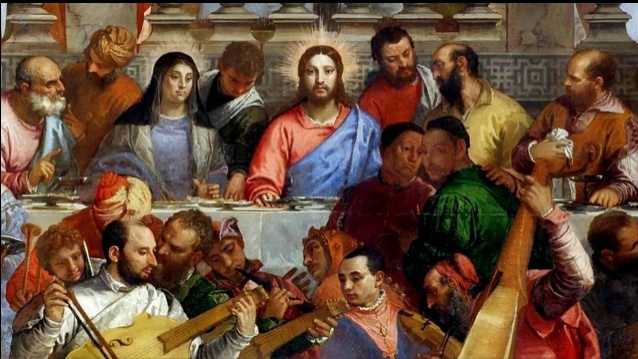
Rejoicing, reviving, banqueting, being filled with superabundant life, defeating death. These are the images that this week’s readings bring us about God’s kingdom of love, justice, peace, goodness, and mercy.
The banquet image is often used in the Bible to refer to God’s abundant gifts for all His people. In a good banquet offered with generosity and good intentions, everyone has more than enough to eat and drink, there is music and merriment, joy, and a sense of sharing with one another. Life is celebrated and cherished, and no one is left out.
What takes place in a well-meaning banquet is a good token of the kind of life God has always meant us to live. He is constantly inviting us to rejoice in the abundant life He wants to give us, and to share this abundance with all.
Images are powerful, but they can be contradictory too. Life as we know it is not always like a banquet. There is poverty and scarcity, pain and suffering, injustice, cruelty and selfishness, natural disasters, wars, epidemics, and death. So, what can we make out of the banquet image?
The Christian perspective on life is based on the present tension between the already inaugurated Kingdom of Heaven--whose powerful and certain signs were given by Our Lord Jesus Christ, the perfect incarnation of Our Father and Creator, but had already been prefigured throughout the whole history of humankind--and the not yet perfected Kingdom. The Church, the Holy Assembly of Christ’s faithful followers, has the mission to keep on giving these signs with humility and perseverance, until God becomes all in all.
Because we have been created in God’s image and likeness, we are free to heed our Heavenly Father’s invitation to take part in the making of a new world governed by the sharing of His unconditional Love, or reject it. We are free to go on our own business, thinking that true happiness can be gained by self-centered pursuits. We can even become enraged by those who insist on inviting us to follow Jesus’ Way of Love and try to get rid of them, even in violent and cruel ways. But God will never tire of extending the invitation.
By rejecting it, we will end up making our lives miserable, and contribute to making others’ lives miserable as well. As long as we live in this imperfect world, there will be suffering and sadness, and people will get sick and die, but much of the suffering in the world could be alleviated, even cured, if only we dedicated our lives to the efficient sharing of God’s abundant love with thanksgiving and complete trust in His Peace, which surpasses all understanding, as Paul suggests in his letter to the Philippians.
We are free to accept or reject God’s invitation. The consequences are up to us, of course. But if we accept, we had better make sure that we honor the invitation by committing ourselves to take part in it. We cannot take it lightly or try to mock God. Just as attending a formal occasion in casual clothes may be taken as a way of disrespecting or mocking the host, God knows what is in our hearts and minds, and He cannot be fooled. We can only fool ourselves and end up feeling even more miserable in the end.
Life as we know it may not be the banquet of our dreams, but we have been put in this world for the purpose of taking part in the preparation of God’s splendid banquet for all. Those of us who have taken part in the planning and implementation of a festivity know that these preliminary steps can bring as much joy as the event itself. Rejoice then, that we have been invited to take part in the making of God’s all-inclusive banquet for all, and that when it is all ready and set, we will certainly not be left out.
Fr. Carlos Expósito, Rector
|
RETURN TO TOP
Emptiness as Glory
This Sunday and Beyond - September 20, 2020
Get it in PDF form with calendar
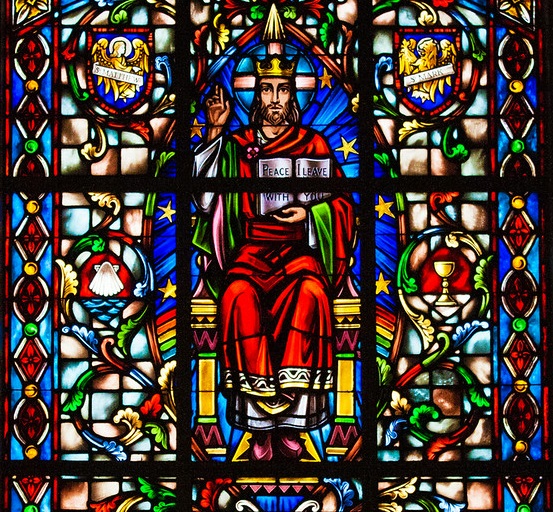
Having the mind of Christ’, ‘being heirs of His Glory with the Father’. These and other similar phrases are used in Scripture and Theology to define what we, Christ’s followers, aspire to achieve.
We recognize Jesus Christ as our Lord and Savior. We claim we are willing to let Him be the ruler of our lives and give Him all authority in showing us the right way to become God’s true image. Sometimes we may be reluctant to do so, but we strive to follow in His footsteps and ask the Holy Spirit to enable us to surrender our self-centered nature to His Way of Love.
But why are we willing to yield our personal interests to Christ’s authority?
For centuries humankind has linked the idea of authority to power. Certain people, in virtue of their knowledge or prestige, or because they have inherited or conquered certain positions in the social sphere, must be obeyed. This kind of authority may sometimes result in due hierarchical order in society, and those exerting authority have the sacred duty to represent the interests of the common good, but unfortunately this is not always the case. Some people have used this ‘authority’ for selfish and abusive interests, exploiting others and maintaining their status either with the use of deceitful demagogy, or through force and fear.
Democratic societies are characterized by the avoidance of this kind of authority, so we are taught to reject any kind of imposed obedience not based on reasonable and accepted premises. In this respect, Christ’s authority in our lives might be disputed by a liberal way of thinking. However, the basis for His authority is just the opposite of what any kind of authoritarianism might be. No one has expressed the reason for Christ’s authority and Glory better than Paul in his letter to the Philippians, Chapter 2, verses 1-13.
Referring to Christ’s mind as the token of every true follower of Jesus, Paul describes Christ as the one
“who, though He was in the form of God,
did not regard equality with God
as something to be exploited,
but emptied Himself,
taking the form of a slave,
being born in human likeness.
And being found in human form,
He humbled himself
and became obedient to the point of death--
even death on a cross.
Therefore, God also highly exalted Him
and gave Him the name
that is above every name,
so that at the name of Jesus
every knee should bend,
in heaven and on earth and under the earth,
and every tongue should confess
that Jesus Christ is Lord,
to the glory of God the Father.”
This beautiful and profound passage, which is one of the first Christian hymns that were used by the primitive church, teaches us why we should bend our knees to Jesus Christ our Lord. It is His self-emptying, His sacrificial and unbounded love for all that constitutes His exaltation and glorification. He is not asking us to submit our wills to His to exploit us or exert undue power upon us, but to enable us to exert God’s will, God’s authority in our own lives. As Paul says at the end of this passage, ‘‘for it is God who is at work in you, enabling you both to will and to work for His good pleasure.”
No dictatorial, abusive, or delusive power on earth can be matched with the authority that Christ enables us to share with Him, one that is based on God’s truth, justice, and infinite love. May we cherish it and delight in it as our true inheritance in Christ our Lord.
Fr. Carlos Expósito, Rector
|
RETURN TO TOP
A Life Worthy of the Gospel of Christ
This Sunday and Beyond - September 20, 2020
Get it in PDF form with calendar

In the first chapter of his letter to the Philippians, Paul shares his inner contradiction between his deep longing to be with Christ already and the need to continue sharing the Good News of Jesus’ Way of Love with as many as he can. Despite the irresistible attraction of the former option, he decides that following the latter is God’s will for the time being, since he is still on earth. There is another good reason for wanting to remain in the flesh: the vital need to support the communities that he had founded.
As Jesus’ disciples and heirs of Paul’s legacy, we are also called to follow in their steps. Our great hope is to abide in Christ’s luminous presence, and we strive to live our lives in such a way that the temporary things of life do not lead us astray from the eternal ones. In other words, we use the temporary goods of this life in such a way that they prepare us for the true life in communion with our Lord and Savior, and we long for the moment when this communion can be fulfilled.
What this means in practical terms is that we value this life as part of God’s plan for us. We are joyful and thankful for the good things, for the great people that we share our lives with, for the learnings that even harsh times bring to our lives. But we always treat the present time as pilgrims on the way to a better place. We Christians should always be on the go, aiming at something higher and better, not letting ourselves be lured by the false promises of the present world.
But at the same time, a good Christian life has a purpose that goes beyond the personal aspiration of abiding in Christ’s light. Jesus’ Way of Love is clearly a way of sharing, of caring for one another. There can be no real happiness, no authentic joy in our lives unless we feel that others are partakers of our joy. Therefore, the Good News needs to be proclaimed and lived out so that others can also share in our happiness, and their souls can also receive the blessing of Christ’s saving love.
We are living in very confusing times, in which fear and hatred abound, social media responding to powerful influencers have practically become the new rulers of this world, and many are even afraid to speak out the truth of Jesus’ Good News of Salvation for all. In challenging times like these, it becomes imperative to ask the Spirit of Truth for deep discernment, and for the strength and courage to speak and act out Christ’s saving message for this world. We have been entrusted this mission by Christ Himself, and we cannot let Him down.
The temptation to follow the easy way is always present. But “wide is the gate and broad is the road that leads to destruction…” Only by resisting, by opposing the misleading fads and trends of the moment, with deep discernment, rooted in prayer and Scripture, with the help of our brothers and sisters in Christ, can we overcome evil and be bearers of Christ’s true Way. Then our lives will certainly be, like Paul’s, worthy of the Gospel of Christ.
Fr. Carlos Expósito, Rector
|
RETURN TO TOP
Being One and Diverse
This Sunday and Beyond - September 13, 2020
Get it in PDF form with calendar
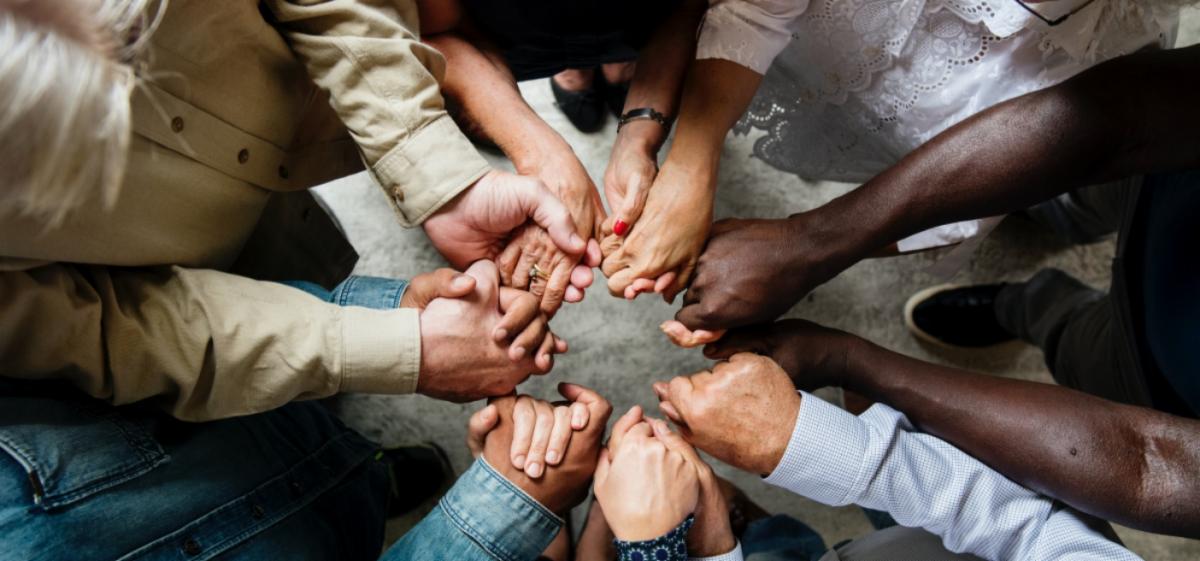
In Chapter 14, verses 5-12 of his letter to the Romans, Paul insists that Christ’s followers should not judge or show contempt for their brothers and sisters in the Lord based on their different devotional practices or customs, Those things are non-essential and each person is convinced in their mind that by so doing they are serving the Lord.
Paul had a hard mission. Bearing the Good News of Salvation in Christ to the Jews was hard enough, because they would have to break away from centuries-long established dogmas to accept Jesus’ New Way. But at least these people had a common background of customs and devotional practices of which Jesus was also a partaker. But the Gentiles were different. And there were different kinds of Gentiles with varied religious backgrounds and customs.
So, Paul had to find a way to reconcile the different practices that were not essential to the acceptance of the Christian faith. And he knew he could not ask people to accept the Jewish practices or any other Gentiles’ practices as a pattern for all believers. That would only have caused rejection and conflict. He used common sense. He knew that, after all, even within communities where people follow similar practices, each person is a unique image of our Creator. He insists on this fact when he uses the image of the different members of the body as essential for its good functioning. He not only acknowledges the uniqueness of each person but celebrates it and considers it the greatest of blessings.
Therefore, it is high time we, the Christians of this century in which the acceptance of the diversity of humankind has become a universal trend, learn not only to tolerate or accept the diversity of human beings that partake of our kinship, but to celebrate it and, as Paul did so many centuries ago, consider it the greatest of blessings.
It is unfortunate that sometimes we Christians are so slow in the realization of what the Apostle Paul celebrated and blessed so many centuries ago: that we are one in our Father and Savior Son, in the unity of the Holy Spirit, and in the blessed diversity of the unique expression of God’s image on earth. It is time to change this. And as Christ’s followers, we must be on the front line in this battle, the battle for total inclusion, which is a vital part of the battle for the establishment of God’s reign on earth.
Fr. Carlos Expósito, Rector
|
RETURN TO TOP
Keeping the Body Together
This Sunday and Beyond - September 6, 2020
Get it in PDF form with calendar
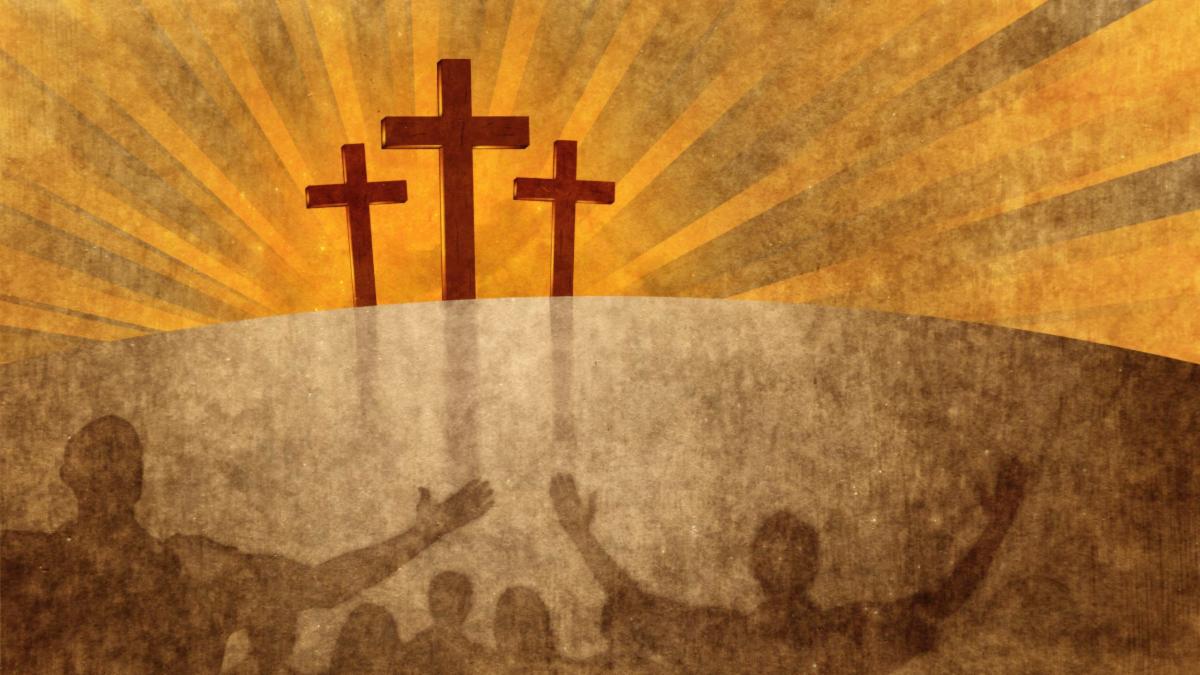
There is no question that when we must do without any part of our bodies the whole body suffers. Think about those who have unfortunately lost one of their limbs, or one of their organs has stopped functioning properly. There are only a few exceptions to this. The appendix is perhaps the best-known example. Tonsils and gall bladders are often taken out when their malfunctioning harms the body, but even so doctors try to find other alternatives because the lack of these organs bring about certain limitations in the normal functioning of our bodies.
For the body to function properly, all its constituent parts must not only be present but must also function in such a harmonious way that the healthy functioning of the body can be kept. In other words, the aim of each part is not the part itself, but the whole body
We all know what happens when some cells stop functioning in harmony with the rest and become self-centered. They want all the nutrients for themselves and start to attack other cells to satisfy their insatiable greed. They reproduce inordinately and invade other tissues and organs. This condition is known as cancer. When this happens, these cells need to be removed so that the body can survive. When they are so spread out that removal is no longer possible, or when vital organs are seriously affected, the body dies. The irony is that the selfish cells never win. They are either removed or die together with the body they kill. That teaches us a lesson.
We are the Body of Christ, the Church, the Assembly of the Saints. Each one of us is a vital part of this body. We are all needed. We all have something vital and unique to contribute to this body. But when we start putting out petty selfish interests before the common good of the Church, we are like the cells that destroy the body. The Church can get ill. It has throughout its long history gotten seriously ill and recovered several times. External enemies can harm the Church just as extraneous bodies and other outer agents can also harm the human body. But the worst enemies and the ones that can pull the Church apart are the internal divisions.
In the Gospel reading for this Sunday Jesus instructs his followers how to act when someone in the Church becomes an offender, a cause of division. He insists that everything possible must be done to make this person repent and keep them in the Church. Everyone must get involved if needed to save the integrity of Christ’s Body. It is not a matter of satisfying someone’s sense of justice here. The fact is that Jesus clearly states that the offended one must take the initiative to make reconciliation possible. What matters is the integrity of the Church, not the satisfaction of someone’s wounded ego. Even when the offending person cannot be made to change their way, Jesus does not advise total rejection, but to consider them as someone who needs to be converted, just as the heathens or publicans that Jesus’ followers converted to His Way of Love.
When the body is healthy and integral, it can do wonders. So does the Church when there is harmony and health in its ranks. The Savior’s name can only be properly invoked by those who make up a unified and healthy Body, whose purpose goes beyond the individual interests to the great common good, the greatest good, God’s will on earth. When that happens, there is no doubt that all that the Church asks the Lord for will be granted them in due measure, the measure of super abundant love.
Fr. Carlos Expósito, Rector
|
RETURN TO TOP
Our Lives as a Living Sacrifice
This Sunday and Beyond - August 30, 2020
Get it in PDF form with calendar
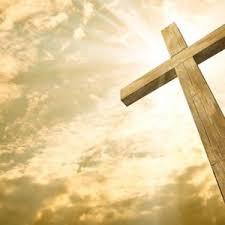
In the 12th chapter of Paul’s letter to the Romans, we read that he entreats his readers “to present your bodies as a living sacrifice, holy and acceptable to God, which is your spiritual worship.”
Jesus’ life is, undoubtedly, the epitome of this offering. All His life, culminating with the actual giving of His body on the cross, was the perfect fulfillment of such a sacrifice.
Although there were and there have been cases in which Christians have actually died for their faith, neither Jesus nor Paul had this specific requirement in mind when they talked about presenting our bodies as a living sacrifice or losing our lives for Christ’s sake. Rather, they were talking about something that we all can and ought to do, to live our lives in such a way that our priority becomes God’s will, and not the selfish satisfaction of our egocentric desires.
Losing one’s life in the sense of letting our self-centered motives go and replacing them with God’s motives and intentions for our lives and the world, is what we are constantly called to do, if we are to be real followers of Him whose life is God’s perfect human image, our Savior and Lord.
But how can we accomplish this hard task?
First, we need to accept the fact that it is not something we can simply do by our own efforts. If we believe that our will is all we need, we have already failed. Only the strength, the perseverance, and the constancy that the inspiration of the Holy Spirit can provide us with will enable us to succeed. And then, as Paul himself warns, we need to stop conforming to the present world, and allow the Spirit to transform our minds in such a way that God’s will can be discerned.
Conforming to the world has always been the way in which human beings have felt they “belong” to a given society. Not conforming makes them feel like outcasts, and that is a great burden for anyone. Nowadays, we are bombarded by the media in such a way that it is extremely hard not to “conform” to what they dictate. We are made to believe that we are freer than ever, because there is so much to choose from, but the sad fact is that almost everything we find in the media has been programmed to conform us to a given way of thinking and acting, the way of selfishness and limitless ambition, the promise of the fulfillment of our most extravagant egotistic desires.
We should not be deceived. The times we are living in demand that, more than ever, we should pray ceaselessly to the Holy Spirit for discernment of God’s will. And, as Paul says, we should understand that we have human limits, and that each of us has been given different graces in the form of gifts, that will all contribute to the right functioning of Christ’s body, just as the different parts of a body function harmoniously to make it work.
No one should think more of themselves than what Our Lord has granted them to fulfill. But that does not mean we are not blessed by His infinite graces. In the fulfillment of God’s Way of Love for the world, we all have a unique role to play. Our physical lives are how God’s will is carried out in the world. Playing our role with humbleness and devotion is our real spiritual worship to our Creator. And that is, as Paul says, good and acceptable and perfect.
Fr. Carlos Expósito, Rector
|
RETURN TO TOP
Crumbs of Super Abundant Grace
This Sunday and Beyond - August 23, 2020
Get it in PDF form with calendar
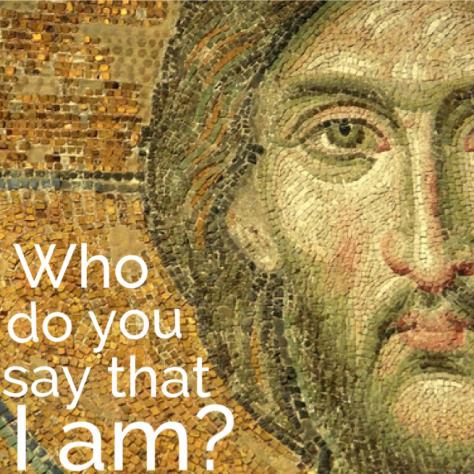
Someone’s identity is much more than what a person does for a living or the role they play in their life. We sometimes tend to identify occupation or role with identity, but true identity has to do more with one’s unique features, with one’s essence, with being rather than doing or wanting.
When Jesus asks His disciples who the people say He is, He is inquiring about how the people identify Him. The disciples tell Him the different identities ascribed to Him by the populace. Some believe He is a sort of incarnation of John the Baptist, whom Herod had recently beheaded. For others, He may be the incarnation of a prophet like Elijah, or Jeremiah, or some other. There is obviously a similarity in the things Jesus says and does and those of the aforementioned characters. They all spoke of repentance, justice, restoration and obedience to God. But all these ascribed identities miss the mark.
It is when Jesus asks the disciples who they think He is that Peter (still known as Simon), obviously filled with the Holy Spirit, declares Him to be the Messiah, the Son of the Living God. It is a revelation that comes from God’s Spirit of Truth, and speaks of Jesus’ real identity.
It is then that Jesus gives this disciple the mark of His real identity. The name Jesus ascribes to him (Peter) at that point will become the defining feature of his followers. They are to be the rocks upon which the Assembly of the Saints—the Church—is to be founded. And this particular disciple is to bear that mark in a very special way all through his life and ministry from then on.
As Jesus’ followers, His disciples of this time, people can come and ask us who Jesus is for us. It is very likely that if we have been part of a Christian denomination long enough, we can easily give a “theologically correct” answer. Some parts of the Creed that we know by heart can help us with this proper definition of Jesus’ identity. But this is not probably what people really want to know. They are probably inquiring about what He actually means to our lives, to who we are, how His identity and ours intertwine, and how this relationship changes and conforms our everyday lives.
As His disciples, as the Church that we are, we also bear the mark of the one He called Peter, the Rock, the firm foundation of His Holy Assembly. And our words, our deeds, our whole lives, must unequivocally show that we are the ones whose identity holds the keys that will ultimately open the gates of God’s Reign of Love for everyone.
Fr. Carlos Expósito, Rector
|
RETURN TO TOP
Crumbs of Super Abundant Grace
This Sunday and Beyond - August 16, 2020
Get it in PDF form with calendar
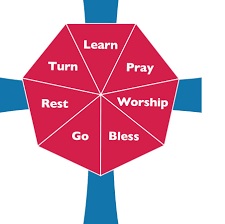
We live in a society of super consumption and super waste of food and other essential items. We are used to taking for granted that we will never lack, that we will have more than we need and that we can simply throw away the leftovers. In other parts of the world, and even in the middle of our cities, there are those who lack even the most essential things to survive and would be happy to have an insignificant part of what we mindlessly throw away.
However, taking for granted that we deserve everything is not confined to the realm of material goods. The Jewish people were the undeserved recipients of God’s infinite grace in a special way. They were chosen by God to be the holy people who would live according to their Lord’s governance and His Way of Love. They were also called to be the beacons of this Way for the rest of the nations. Some understood this mission properly and tried to follow, being aware that the grace they had been granted needed to be gratuitously shared with the rest of humankind. But others conditioned God’s grace to the following of their own customs and rules, many of which were no longer a true reflection of God’s will.
God’s incarnate Word was born as part of this chosen people. Jesus understood His mission within the context of the Law that God’s chosen people had received. He understood that this original Law had been corrupted and misunderstood in most cases, and that He had come to make the Law find its true fulfillment. He knew that the true Law of Love comprised all that the Jewish law contained. His vision was not that the rest of the world should be excluded, but that God’s chosen people would understand their graceful role and take this transforming message to the rest of the nations.
But some among the Jewish people, particularly the ruling members of the official religion, rejected Jesus’ Way of Love. And these people were influential in the masses. They failed to feed their own people or the rest of the nations. They simply took for granted God’s Grace and wasted it away.
The encounter between Jesus and the Canaanite woman is a very controversial passage that appears both in Matthew and Mark. It is hard to like what Jesus said to the woman before He grants her the grace she was asking for desperately. He called her “dog” as opposed to the children of Israel. Even though some commentators have clarified that the word Jesus used referred to a pet dog, and was therefore not so pejorative. There is a clear discrimination and humiliation here. No one can really ascertain what Jesus had in His mind and what His inner motives were, but it is still hard to like His words here.
Whether the woman made a change in Jesus’ mindset in relation to His mission remains a debatable issue. Some commentators say He was simply testing both the disciples and the woman’s faith. That is debatable too. Even though we may dislike His words, the fact remains that He offered God’s healing grace abundantly to this woman without asking anything in return. The passage does not say that the Canaanite woman stopped worshiping her gods and was converted to Jesus’ Way. She did use a Messianic name for Him when she called Him, but this is probably what she had heard from some of her Jewish neighbors. She had also heard about Jesus’ miraculous healings, and that was what she desperately needed. She recognized herself as an outsider and was content with the crumbs of His abundant grace shed upon her daughter. She was not denied that grace, even though she did not offer to change her old ways in return.
The Church is the new Israel. We are now God’s chosen people to illuminate all the nations with His Way of Love. Like the old Israel, however, we often fall into the temptation to take God’s Grace for granted and waste it away. And we often forget Jesus’ encounter with this woman, the one that He asserted had “great faith”. Let us never forget that God’s loving Grace is unconditional. A conditioned grace is no grace at all. We are to shed it abundantly, as we have received it from our Savior and Lord, so that it reaches out to the confines of the world.
Fr. Carlos Expósito, Rector
|
RETURN TO TOP
Why Do We of Little Faith Doubt?
This Sunday and Beyond - August 9, 2020
Get it in PDF form with calendar

Most of us are very familiar with the passage of Jesus walking on the water. It appears in the Gospels according to Matthew, Mark, and John. Matthew, however, is the only Evangelist that introduces the incident of Peter walking towards Jesus on the water and the exchange of words between Peter and Jesus. This is the account we are focusing on this week.
The traditional and probably most accepted view of this incident is that Peter doubted, he was afraid when he noticed the high waves and the wind, and even though he had already walked a few steps on the water, he started to sink and had to cry out to Jesus for help, because he had no steady faith. After holding his hand, Jesus said to him, “you of little faith, why did you doubt?” This is normally read as a rebuke, a scolding by Jesus, and many a sermon have been written around this theme. The prevalent idea is that we need to have a firm and steady faith, not one that falters when faced with the hardships of life. Otherwise, our Savior will rebuke us and ask us why we doubt.
Having a solid faith that will allow us to praise God and face all our troubles in life with a blissful countenance and attitude may be a wonderful achievement, but how many of us are there yet? Let us simply for a moment put ourselves in Peter’s shoes. He managed to walk a few steps on the stormy sea. Could we at least venture to take the first step? Would we even cry out to Jesus in total assurance that his grip would save us?
Peter was chosen by Jesus, not because he was perfect, but because He enabled him to gradually become a better follower, a better disciple. Peter tried to be faithful to the end. He did not flee when Jesus was arrested; he managed to stay close. And even when he denied Him when pressed by others, he did not simply run away. He was there, bitterly crying when he realized his weakness, but still present. After the resurrection, Jesus confronts him with the question of his love for Him three times, and in this way restores their mutual trust. From that moment on, Peter is even willing to give his own life for Jesus’ Way of Love.
Jesus is a great teacher. He uses questions so that we can come to understand the deep causes of our fears, our failures. He may sometimes use phrases that sound like scolding, but His intention is always to bring out the best in each of us. And He always puts out His loving hand to help us out. No matter how little we may think our faith is, in this gradual process of becoming His followers, our faith is always in the process of getting stronger, with every hardship we face and overcome thanks to His helping hand. Our doubts are real. They are the fruit of painful situations that we have all faced in which we may had a hard time finding Jesus’ helping hand.
That is why the question is necessary. We need to understand why we doubt. We need to face the reality of our weakness, our fears, and our reluctance to depend on Christ. And we must also understand why others doubt. Why they are in despair. Why they have stopped believing in the good in this world. Where has our helping hand been? Where is it now? We proclaim that the Church is in the world to be Christ’s lips, hands and feet. Is our hand extended towards those who doubt in the midst of despair, or do we only remember the rebuking part: “you of little faith”? We all need more faith. But we need to live out our faith, by going deeper into the cause of our doubts and fears, by overcoming them, by depending on Him who can make us defeat all doubt, and by extending our loving hand to those who try to remain afloat in the stormy seas of their lives.
Fr. Carlos Expósito, Rector
|
RETURN TO TOP
Love is an Unexpendable Source
This Sunday and Beyond - August 2, 2020
Get it in PDF form with calendar

We are living in times of pandemic, and the nation’s economy is going through one of its worst crises. As a result of the public health measures that have been taken to protect the population, lots of people are jobless and businesses that cannot comply with the necessary requirements have closed down temporarily; some of them have gone bankrupt and closed down for good. The government has given loans and grants to some businesses, and paycheck assistance to the unemployed. Even so, lots of people are counting their pennies to make ends meet, month after month.
Money is expendable, and so are material goods. When we consume them, we know there will be no more, for ourselves or anyone else. This notion is so ingrained in our subconscious mind that we spend our lifetime struggling with the question if we will have enough to keep ourselves and our loved ones alive. In a way, this also prevents us from being generous sometimes, because we fear that if we give away what we and our loved ones need, we will lack the basic things of life.
Such an attitude prevailed among the Jewish people after God freed them from the Egyptian slavery. During their pilgrimage on the way to the promised land, they constantly feared that they would not have enough food or water to survive. They even entertained the ideas that it would have been better to stay in Egypt. But once and again God was willing to forgive their blasphemy because He understood their fears and provided them with what they needed and craved for.
Jesus’ disciples were not so different in this respect when they realized that the multitude that had been following Jesus was hungry and the night was coming. They used worldly logic. Food is expendable. They had been with them for hours now and they needed to go back to their own towns and get food for themselves. Very logical. But nor for Jesus. His remark must have shocked them: “They need not go away; you give them something to eat.” Even so, they try to dissuade Jesus from what they think is an unattainable task. They explain to Jesus that the food they have is so little, so expendable, that it will never suffice.
Here is where Jesus’ logic and the world’s clash. When an act is guided by true love, there is no way anything can be expendable, simply because love is an unexpendable source. Not only was the multitude fed, there was leftover to be collected.
This pandemic has been devastating and we are all praying that is over as soon as possible. However, even among the great losses and human suffering, there have been acts of kindness, acts of selfless love. There have been donations of money, food and other needed items like never before. Thanks to this, lots of people who would have gone hungry or cold have had enough to eat and wear. And the ones who have donated have had the greatest of blessings in their lives, the multiplication of love for themselves and for the whole world. For the more love you share, the more you receive. It is an inexhaustible source.
As Paul states in his letter to the Romans, there is nothing in this world or in the invisible realms that can separate us from the love of Christ. Not even the worst of hardships, like this present pandemic, not even death. “In all these things, we are more than conquerors through Him who loved us”. Indeed. For His love comes from the Unexpendable Source.
Fr. Carlos Expósito, Rector
|
RETURN TO TOP
The Truest of Longings
This Sunday and Beyond - July 26, 2020
Get it in PDF form with calendar
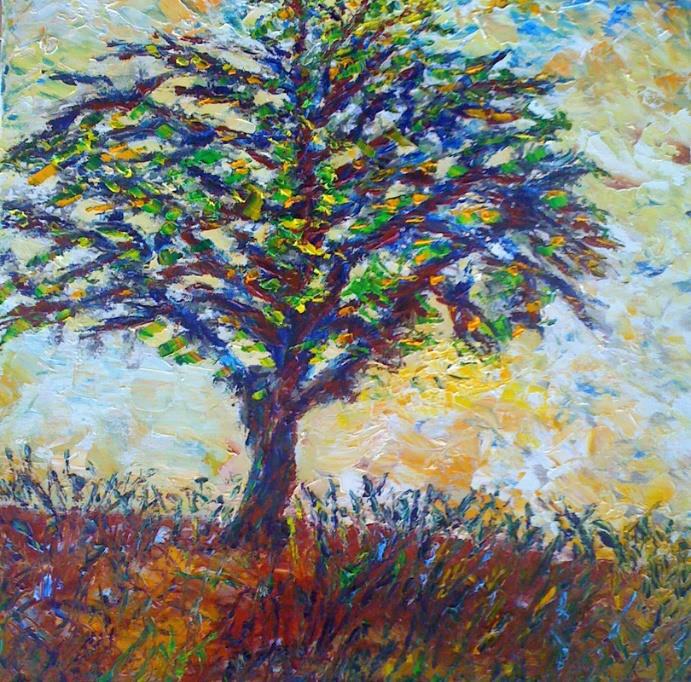
Being content with what we have achieved in our lives can be a satisfying feeling. It can bring us calm and a feeling of self-assurance for a while. But if that feeling lingers too long, it will make our lives stagnant and not very productive. It is the constant longing for greater achievements that make people’s lives more fruitful. This is what has led to the material, intellectual and even spiritual progress of humankind. Paradoxically, it seems that we are never content, never totally satisfied. We always feel there is more to be gained, more to be achieved.
Why is this so?
We have been created in God’s image and likeness. God’s very essence is being creative. He made us so much like Him that we cannot help being creative as well. We are not automatons. If we were, we would simply feel totally realized by carrying out the routine tasks that our material sustenance demands. But thank God we are not that. We are so much more. Our nature draws us to want more, to do more, to crave for more.
There is nothing wrong with being non-conformists. It is part of our nature to always want to improve our lives. The problem is that in our search for improvement we may select the wrong goals. We do not always realize that our final goal is God Himself, becoming more and more like Him, so that we find the real satisfaction, the real realization of our personal and communal lives.
Certain achievements in our lives can bring us closer to God’s purpose. When doctors and scientists discover a wonderful cure for a disease; when laws are passed that make life more just and equitable for everyone; when devices that make our lives less burdensome are made available to all, and constructions make life more agreeable to everyone, these achievements bring our lives closer to God’s intended life and love giving purpose.
Solomon wished to have wisdom to govern the people with justice and God conceded it to him gladly. His longing was in line with God’s longings.
In the series of parables that Jesus uses to give us an idea of God’s Kingdom, there are two people who make the wisest choice in their longings. The man who finds the treasure in the field and the merchant who wants the pearl of great value do not hesitate in putting all their other longings aside to pursue the only one they know will bring the true fulfillment, the true realization in their lives.
It may all start with a small spark of wisdom from the Spirit, as small as a mustard seed or a measure of leaven. But it will eventually spread out and fill our whole lives. Then true lasting peace and satisfaction will fill our lives so completely that we will no longer thirst, and rivers of living water will spring out from us, for all those who need to come and drink God’s life-giving love freely.
Fr. Carlos Expósito, Rector
|
RETURN TO TOP
Weed among Our Wheat
This Sunday and Beyond - July 19, 2020
Get it in PDF form with calendar
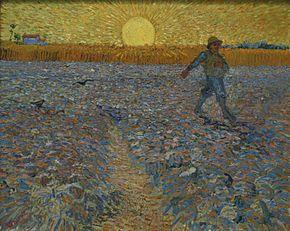
Where does all this evil come from?
When we look at the present world, we are all tempted to ask this question, like the question the slaves in Jesus’ parable asked about the origin of the weeds in the field. They knew their master had planted good wheat seeds. We believe that our Creator has planted a good world. However, just as in Jesus’ time, our present world shows a considerable portion of evil. We believe that we are supposed to have only good thoughts and intentions inside us, but it is not so. There is also evil in our own lives. So, we strive to find a culprit. Could it be the devil? The others? Our genes? God Himself for not halting evil at its very inception?
But in the parable of the wheat and the weed the master was not really interested in naming a culprit or taking revenge. He simply said, “an enemy has done this”. And he did not advise to remove the weed either. He warned that by trying to do so, the wheat might be uprooted together with the wheat, so it was better to wait until the harvest time.
We are living in a time when a pandemic has taken over our lives and all are suffering its consequences. Some have died, some have gotten sick, some have lost dear ones, many have lost their jobs and means of sustenance. So, we feel tempted to blame someone for its inception and someone for not containing it soon enough. And we would probably want those responsible punished in some way. Social unrest because of acts of injustice have also taken over our nation and the rest of the world. And we are eager to find and shame historical culprits and even feel guilt and remorse for not pointing the culprits out.
The parable of the wheat and the weed, however, tells us to let the crop grow. The time will come when the good fruit will be reaped and the useless one will be disposed of. By letting the good grow and develop in our lives, even amid evil, we learn to be patient with others’ lives, and with our own. We learn to imitate the Creator who makes His sun come out and the rain fall for both the good and the bad, and who is “gracious and full of compassion, slow to anger and, and full of kindness and truth.”
It is not a matter of becoming complacent with evil. The parable clearly states that God will reap the good fruit and will do away with the disposable part. We need to recognize the evil in the world and in our own personal and communal lives. But, as Paul says in his letter to the Romans, we must have patience and hope that we and the whole of creation will be redeemed. There is a place for repentance and forgiveness in the process. A place for graceful transformation and redemption. Living our lives in a world where good and evil are intertwined is painful. There is no clear white and black most of the time, and we must endure the suffering while we strive to make the good in our lives grow and yield the good fruits of life. But it is precisely this patient and hopeful process that makes us grow in a spiritual sense. As Paul states, “the sufferings of this present time are not worth comparing with the glory about to be revealed to us”.
Fr. Carlos Expósito, Rector
|
RETURN TO TOP
Fertile Soil for God's Word
This Sunday and Beyond - July 12, 2020
Get it in PDF form with calendar
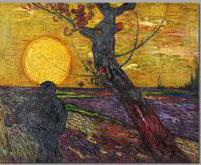
In Chapter 55 of the Book of the Prophet Isaiah there is a rich poetic comparison between the water cycle and the purpose of God’s Word. The prophet says, “For as the rain and snow come down from heaven, and do not return there until they have watered the earth, making it bring forth and sprout, giving seed to the sower and bread to the eater, so shall my word that goes out from my mouth; it shall not return to me empty, but it shall accomplish that which I purpose, and succeed in the thing for which I sent it”.
The Word of God is a powerful image that has come to be known as that which acts out God’s will. It was through this Word that the whole creation came into being. It was through it that the leaders of God’s people and the prophets made God’s will known to them so they could act it out. It has been through the written Word of God, the Holy Scriptures, that people have been reminded of God’s acting will throughout the centuries and so many lives have been wonderfully transformed into the likeness of God’s true image.
Above all, it was through God’s incarnate Word, Jesus Christ Our Lord, that God’s kingdom of unconditional love was revealed to humankind in the most tangible way possible, in human flesh. And His Word, in perfect harmony with His deeds, guide us in His Way of Love so that we can also be effective carriers of God’s Word for the world.
As followers of the Word Incarnate, Christ our Savior and Lord, we are called to incarnate His Word in our lives, to act out God’s loving will in our here and now.
In the Parable of the Sower, which can be thought of as the mother of all of Jesus’ parables, because it is the first one in a series, and the first one he explains; but also because it refers to God’s Word and how we let it act on us, Jesus compares the way the Word is received and made to act with different kinds of soils where the seeds fall while sowing. So, he presents different scenarios: the seeds that fall on the road, the ones that fall on rocky ground, those that fall among thorns, and finally the ones that fall on fertile ground. All these were plausible situations during the common practice of sowing seeds in Jesus’ time.
The result of each scenario, except for the last one, is always a negative one. Only the fertile soil enables the seeds to bring forth abundant grain, depending on the degree of fertility.
Likewise, only when we open ourselves to God’s life-giving Word, and not only receive it joyfully, but let it sink deeply into our minds and hearts so it becomes an essential part of our lives, are we capable of incarnating His Holy Word. When that happens, then what God put in Isaiah’s mouth becomes true for us, “the Word shall not return to me empty, but it shall accomplish that which I purpose, and succeed in the thing for which I sent it”.
Fr. Carlos Expósito, Rector
|
RETURN TO TOP
Setting Our Minds on the Spirit
This Sunday and Beyond - July 5, 2020
Get it in PDF form with calendar

In parts of chapters 7 and 8 of his letter to the Romans, the Apostle Paul reflects on his inner battle with evil. He clearly perceives there is a struggle between his inmost desire of God and the desires of the flesh. He also acknowledges that the Law is not enough to enable us to overcome those evil desires, but Jesus Christ our Lord is!
By His incarnation, by becoming one of us in the flesh, Christ was able to overcome sin for us, so that by abiding in Him we can be victors over sin and followers of the Way of the Spirit, which is the Way of life and peace.
But what is the Way of the Spirit as opposed to the way of the flesh?
The use of the term flesh may mislead us to think that the bodily part of our lives is intrinsically sinful. But God created us with a body. We are also our bodies. It is with our bodies that we relate to our fellow human beings and the whole of creation. Paul himself says that our bodies are the temple of the Holy Spirit, so they are holy. The Church is said to be the Body of Christ. It is through it that Christ continues to act in the world.
The use of the term flesh by Paul as opposed to Spirit has to do more with the desires of our human nature that make us selfish, self-centered, wanting to please and satisfy ourselves regardless of the needs of others, than with our bodily constituents. Likewise, when we think of the spiritual life, we should not be misled to think that we need to get rid of our corporality or punish it or ignore it to live spiritual lives.
In fact, the real spiritual life is a life consecrated to serving God, our fellow human beings, and the whole of creation. And it is with the use of our whole beings, minds and bodies, that we can carry out this sacred duty. The more we depart from the demanding desires of ourselves and become better bearers of God’s unconditional love, the more spiritual our lives will be.
We do not need to become bodiless to set our minds on the Spirit. We do need to understand that trying to follow the Law by our efforts only, will not set us free from our sinful desires. The battle that Paul describes is our own battle. But we are not alone in it. Christ our Lord has overcome this battle for us. If we let the Holy Spirit, the Spirit of Truth, guide us in the battle, we shall be victors. And true and abundant life, and the peace that surpasses all understanding will be our sure reward.
Fr. Carlos Expósito, Rector
|
RETURN TO TOP
What Is Wrong with ‘Peace’?
This Sunday and Beyond - June 28, 2020
Get it in PDF form with calendar

Hearing Jesus say that He had not come to bring peace but a sword must have been unsettling to His followers. After all, the Jewish Shalom (the term which was translated as peace in the New Testament Greek) was a word that meant not only absence of conflict, but all the good things that could be expected in God’s Reign. And Jesus was not known as one to promote revolts or armed conflicts.
So, what did Jesus mean?
It is interesting to note that there are instances in which The New Testament refers to peace in a distinct way. In John 14:27 we read that Jesus says to His disciples, “Peace I leave with you; My peace I give to you. I do not give to you as the world gives.”
The Apostle Paul, in turn, refers to peace in his letter to the Philippians in these words, “The Peace of God, which surpasses all understanding…”
This makes us perceive that there is a distinct way to think of peace in God’s Reign that may not correspond to what the world normally thinks of as peace. In fact, the Roman Empire under whose rule the Jews lived in times of Jesus was famous for its maintenance of ‘peace’ for all those who accepted their rule. They even committed to defend those territories who were part of the Empire and grant them the Roman ‘peace’.
When ‘peace’ has to do with the keeping of the status quo, whether in the household, in the neighborhood, the city, the nation or the world, it is mainly perceived as the submission to those factors that keep everything as it has been, so that there is no conflict among the different parties. This is what the scribes and interpreters of the Law had been trying to do in Jesus’ time. Deep inside, they rejected and despised the injustice of the Roman occupation, but they concluded it was better to submit to it and enjoy a certain degree of ‘peace’.
Jesus’ radical Way of Love could not fail to bring about conflict with the status quo. Unconditional love leaves no place for injustice or unequal treatment. It goes far beyond that though. It proclaims forgiveness even for the enemy, and the inclusion of all peoples in God’s salvific plan. These ideas would not be accepted by the established Judaism of Jesus’ time. There would be conflict with those in the household. Families would be divided. Those who wanted to follow Jesus’ Way of Love would have to make a radical and hard choice.
But the hardest conflict would be with the old self. Leaving the old self behind felt life giving up life itself. But as Paul points out in his letter to the Romans, we have died Jesus’ death so that we can be raised to Jesus’ resurrected life. Unless we let the old self die there can be no true resurrected life in us. The cross needs to be embraced so we can gain true life.
Jesus’ Way of Love is also the Way of the Cross. Conflict will not leave us until we have overcome the world, as Jesus has. Moreover, it will not leave us until we have conquered our old self. But there is a Peace that surpasses all understanding, Jesus’ Peace, the one that He gave His followers even after His resurrection. He will give it to us too if we ask Him. And then, His words will resound deep in us, ‘trouble not your hearts; be not afraid’.
Fr. Carlos Expósito, Rector
|
RETURN TO TOP
Unpopular Witnesses
This Sunday and Beyond - June 21, 2020
Get it in PDF form with calendar
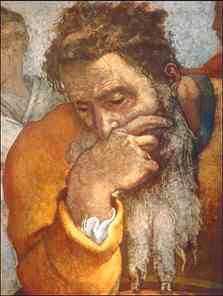
What the prophet Jeremiah was appointed by God to tell his people was not well received. But history proved him truthful in the end. He was the prophet that announced the Babylonian captivity to the people of Judea. Perhaps if those in power had listened to him, they would have saved themselves and a great part of the people a lot of suffering. But they did not. They insisted on looking for foreign alliances that would not work out well. And they put God’s true prophet in prison while they listened to fake ones.
It is not hard to imagine how this prophet must have suffered. On the one hand, he felt the irresistible impulse to tell the truth, to be a real witness to God’s true Word. On the other, he felt that his truthfulness and loyalty to God only brought him misery, derision and contempt. But true witnesses must choose the hard way, no matter what the cost is.
If Jesus enjoyed a certain measure of popularity among the common people—something He never really intended—due to His healing, feeding, and life-restoring acts, this popularity was certainly overstepped by the deep hatred he gained among the ruling classes of His time. So much so that they finally condemned Him to death through a totally unfair trial.
Jesus was aware of this likely outcome, and He was also aware that His true followers would face the same trials. So, He prepares His disciples for what is to come. He warns them about the high cost of being true witnesses. He foresees that some of them can even die as a result of following the Way of Love, but He assures them of God’s constant presence among the true disciples, the true witnesses, and their unfailing value and acknowledgement by God.
Jesus’ times are very much like our times in the sense that His message is almost as unpopular today as it was then. There was a long period of time in history when Christianity became the generally accepted ‘norm’ for a great part of the world. But that time is gone. We may feel nostalgia for it, but to be honest, accepting an established norm because it is socially advantageous does not say much about the integrity of the followers of that norm. It does not mean there could be no true witnesses among those followers. There certainly were. But it is when something becomes unpopular that it takes real courage and integrity to be a part of it.
The Christian Church today still has some influence in some parts of the world. It is still accepted and respected in most countries, but there are places where it has been openly persecuted and rejected. But even where it is not dangerous to be a Christian, we can no longer expect to be heard and followed just because we are part of the Church. Our message will be questioned by many. It will even be scorned and despised by some.
Amid so many conflicts, when our voices are not one with God’s authentic voice, we become totally useless as witnesses, even if we gain some popularity among the ruling classes of our time. We should not confuse compliance with the popular voices of the day with true evangelism. That does not mean we should advocate for violence and revolts either. The Apostle Paul was noticeably clear on that point. We need to ask the Holy Spirit for discernment, for what God’s authentic message should be for the times we are living. And then we should not be concerned about being unpopular. Our only concern should be to be true to God’s message, to be His loyal witnesses, the Jeremiahs of our time.
Fr. Carlos Expósito, Rector
|
RETURN TO TOP
ENABLED THROUGH GRACE
This Sunday and Beyond - June 14, 2020
Get it in PDF form with calendar

We tend to believe that only the ablest can be given the crucial tasks, or something will inevitably go wrong. Though this may be true when we deal with everyday businesses, even so the success of a task does not depend entirely on the performer’s capacity to carry it out, but also on their commitment, on their perseverance, and their trust that it will be accomplished because it is needed. It so happens that less able people are oftentimes more trustworthy than those who are very able but lack the needed commitment and trust.
God’s infinite Grace is something that never ceases to amaze us. When we think of the reason why the Israelites were chosen by God to be His priestly people, His holy nation, we do not really find any particularly attractive quality that would make them good candidates for this honor. From the very beginning, right after they have witnessed God’s powerful saving acts in their favor, they started to complain and many said that they would rather go back to their servitude in Egypt than go through the ordeals that the new freedom posed for them. Even so, God insisted that if they kept the covenant whose initiative was God’s, they would be His Holy nation for the whole world.
And then we come to the choosing of the twelve apostles by Jesus. Who were these people? Were they prominent elders? Scribes? Prophets? None of that. Most of them were fishermen. One of them was a tax collector, an occupation that was greatly despised by the Jews. Another was a radical violent opposer to the Roman Empire. In the end, Jesus was betrayed by one of them.
Perhaps it was precisely because they were not prominent men in the society that Jesus chose them. Their minds were not so infected by the ‘establishment’ of the time. They were more malleable, so to speak. But even after they had spent time with Jesus and had received the Grace to show the sure signs of God’s Kingdom, they still faltered and failed. They failed at the crucial time. They could not keep watch with Jesus before His arrest. They were disbanded after His arrest. Peter, trying to be faithful and follow his master during the trial, ended up denying Him as Jesus had predicted.
But the Resurrected Lord did not discard these people. He knows of our human weaknesses and failures. He also knows about the power of Grace. He did not choose them because they were the ablest. He chose them because He knew His Grace would empower them to carry out the mission He had entrusted them with. And when the Holy Spirit filled them, they were unstoppable. Not even the threat to lose their physical lives could deter them.
So it happens with each and everyone of us. The making of God’s Kingdom started centuries ago, and it is still going on. God needs laborers for His harvest. He needs us. What are we to think? That we do not possess the necessary qualities to take part in His work? History has given us enough proof that those that have done the most for the making of His Kingdom are not necessarily the ablest, but the ones who really commit and are willing to love and serve without expecting anything in return. Those are the true saints.
God does not choose those who are able. He enables those He chooses. All we need to do is let His powerful Spirit fill us with His enabling Grace.
Fr. Carlos Expósito, Rector
|
RETURN TO TOP
GOD’S TRINITARIAN LOVING DANCE IN OUR LIVES
This Sunday and Beyond - June 7, 2020
Get it in PDF form with calendar
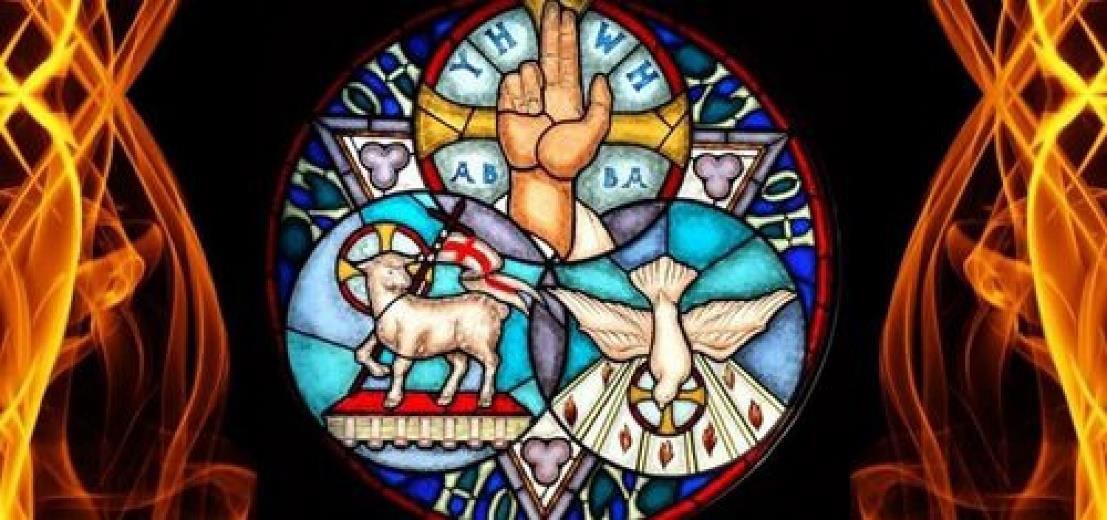
Trinity Sunday is around the corner and we are all living amid two pandemics, one caused by a virus and the other one caused by hatred and injustice. This is a time when our theological reflections in relation to the great mystery of the Holy Trinity might not be so appropriate unless we find a very concrete way of linking this reflection to the pressing demands of the present situation.
What is going on in our country and in other parts of the world?
First there is this virus which has caused a great loss in terms of lives, jobs, housing and psychological stability. We have had to deal with very distressing situations that have also affected the way we worship and think about keeping our communion with God and our neighbor. This has been a time of trial for our faith, for our way of
expressing our love towards our neighbors. And we have all been under a lot of stress.
But even when the pandemic has affected everyone, it is evident that not all sectors of society have been equally affected. The poorest and destitute have not been able to work from home, and they have had to expose themselves to the virus. As a result, a greater percentage of those affected are among the sectors of the population with the lowest incomes. Blacks and Latinos are prevalent among these. Homeless people and those in elderly care institutions have greatly been affected too.
How fair is this? Our Baptismal Covenant has it that we promise to strive for justice and peace among all people and respect the dignity of every human being. But there is no way we can accomplish this promise unless we defend the rights of those who are not given the possibility to live dignified lives.
Recently police brutality in Minnesota took the life of George Floyd, a black citizen. A video showing the very act of taking his life went viral in our country and in all the world. This has sparked a wave of national and worldwide demonstrations demanding justice in this case, and a change that will prevent similar violations from taking place in the future. The fact is that this is not an isolated one-time event. This kind of violence against black citizens by the police has been recurrent for decades now.
Unfortunately, those who ally with the dark forces have taken advantage of the situation and have looted stores and other businesses, have set police cars on fire and have even shot a policeman. None of this can be approved by authentic Christians. We are in favor of the demands for justice, but in a peaceful way. Above all, we believe in the need for a change in the unjust ways our society is structured so that God’s loving governance is better reflected in our nation, in the whole world.
Trinity Sunday reminds us, above all, that God Himself is not self-centered. God is family. God is loving relatedness. The Trinity reminds us all of this constant loving dance among the three persons, in which the distinctiveness of each is respected and cherished but is subordinated to the intrinsic unity.
There is a crucial lesson for us all here. Unless we learn to imitate The Holy Trinity’s way of interrelatedness in our relationships with the rest of humanity. God and the world could not care less how many pages we try to write about the mystery of One God in Three Persons. The real mystery lies in being able to show God’s Trinitarian Love in our own lives. That will make us advocates for justice and peace, and for a
greatly needed change in the whole world, a change that will show forth The Trinity’s Loving Dance in our own lives.
Fr. Carlos Expósito, Rector
|
RETURN TO TOP
SPECIAL GIFTS FOR EACH AND EVERYONE
This Sunday and Beyond - MAY 31, 2020
Get it in PDF form with calendar
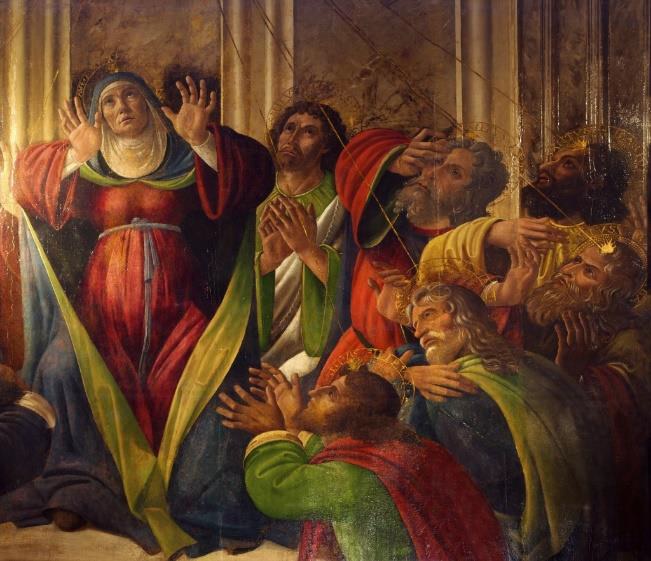
This Sunday the Church Universal celebrates Pentecost, the day of the powerful manifestation of the Holy Spirit to the disciples. Some regard this day as the birth of the Christian Church. It was from this moment on that Jesus’ followers began manifesting the Power of the Holy Spirit in their words and deeds, which faithfully reflected the Lord’s. The Book of Acts is a testimony of this, of how fast the Church grew and multiplied, and how the Spirit filled those first followers with Power and Grace from above, even when they had to face the worst trials, including martyrdom.
But the Holy Spirit has never stopped filling the Church. Jesus’ promise that this Advocate, this Spirit of Truth would defend us and guide us in God’s salvific mission remains as true today as then, and it will continue to do so. There have been times when the Church has needed a revival of the Spirit, a fresh gust of wind, so to speak, and different rekindling moments have taken place throughout its history.
In critical times of the history of humankind the need to be filled with the Power of the Spirit is greater than ever. We are now living very hard times. Times of pandemic. A huge death toll has been the result of this pandemic for this country and the whole world. So many people grieving losses; the loss of beloved ones, the loss of jobs and residences: and the loss of physical contact with friends and relatives, with fellow parishioners at their churches. Even the loss of the Eucharist for those who are regularly nourished with the Sacrament of Christ’s Holy Presence.
But the Holy Spirit has not left us and never will. Jesus Himself encouraged us to always ask, as a priority in our prayers, to be filled with the Holy Spirit. He said that petition would never be denied. He clearly stated this had to be the number one petition in our list.
Paul speaks about the gifts of the Spirit in his first letter to the Corinthians. He refers to these gifts as something the Spirit gives to each and everyone as He wishes. It is not something we earn or deserve. It is given to us gracefully, gratuitously. And it is given abundantly. There is no need to grasp for it. No need to compete.
The image Paul uses to illustrate how these gifts work collaboratively in the Body of Christ is superb. He uses the image of the human body. No part of the body can stand by itself. Each part has its own particular and essential function, each as important as any other. It is not about competition but about collaboration.
Each of us has our unique spiritual gifts that we can cultivate and make even stronger by putting them into practice for the common good. No gifts are “better” or “greater” than others, if they really come the Holy Spirit. We need to understand that all gifts are needed in the Church, in Christ’s physical body on Earth, for a fruitful ministry to become possible. Let us not envy others for their gifts. Let us stop any kind of senseless competition in this respect. Let us always thank our Father Almighty for the unique and precious gifts of the Spirit He has graciously bestowed upon us, and let us share them with all, with joy and gratefulness, in abundant measure.
Fr. Carlos Expósito, Rector
|
RETURN TO TOP
LEAVING YET REMAINING
This Sunday and Beyond - MAY 24, 2020
Get it in PDF form with calendar
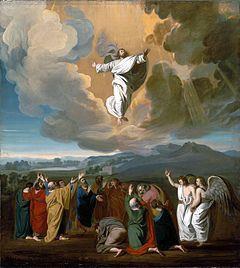
The Feast of the Ascension, celebrated on the fortieth day of Easter, refers to what two of the Evangelists, Mark and Luke, narrate that happened to Jesus after He was raised from the dead and spent those forty days with his closest disciples, giving them instructions about their mission and the assurance of their being filled with the Holy Spirit to carry it out.
That must have been a very special time for these disciples, after their first disillusionment when their Master and Lord had been crucified. They seemed to have lost all hope to have Him with them, sharing time and teachings, giving them assurance and hope, showing them the way of discipleship, and enabling them to be the followers of the reconciling mission He had started with them three years before.
These forty days were like no days in the disciples’ lives. The Jesus they knew was with them, and yet, He was not the same anymore. He was the Risen and glorified Christ, the one that was with them on this earth just for some days, to wrap up some important details about the mission they had been assigned to fulfill, but He was returning to the Father with whom He shared the same glory before the beginning of times.
The Book of Acts tells us that when the moment came for Him to leave, the disciples stayed there, staring at the Heavens, as if they wanted to retain Him, to stop Him from leaving this earthly plane. I am sure we all would have done the same if we had been in the disciples’ shoes at that moment. Who wants a beloved Master and Lord to depart? But they were reassured that He who was leaving would return.
The Gospel according to St. Mark tells us that the disciples “then went out and proclaimed the Good News everywhere, while the Lord worked with them and confirmed the message by the signs that accompanied it”. So Jesus left, yet remained. He did not actually leave them. That is a great mystery of our Christian faith.
Leaving the earthly plane, confined by the time-space continuum, was necessary for Jesus Christ so that He could be with His followers in a totally different way, in such a way that time and space would no longer be an obstacle. He was, is and will be with His followers of all times and places, confirming the message of the Good News of reconciliation by His signs of Love, Peace, Justice and Compassion, given by the Church Universal, His earthly body, of which we are all a part.
Fr. Carlos Expósito, Rector
|
RETURN TO TOP
USING CURRENT THINKING WISELY TO PROCLAIM THE GOOD NEWS
This Sunday and Beyond - MAY 17, 2020
Get it in PDF form with calendar
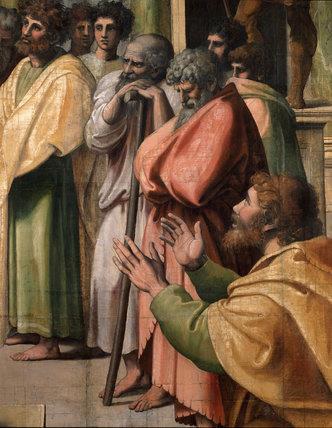
The reading from the Book of Acts for this 6th Sunday of Easter in Year A (Acts 17: 22-31) tells us about Paul’s address to the Athenians in the Areopagus. This is one of the instances where Paul’s wit and eloquence in the service of his Evangelistic mission is most prominent. And it clearly shows us that there is nothing wrong with using our knowledge of the current trends in people’s way of thinking to present the Good News, as long as it remains clear what the Good News is about.
What Paul does is to use the religious and philosophical background of the Athenians to present his argument in favor of God’s redemptive work in Jesus Christ. He starts by acknowledging the great religiousness of the Athenians, even though he was not at all in agreement with their pagan worship. Then he refers to this altar dedicated to “an unknown god”. In their zeal not to leave any deity unacknowledged, so to speak, the Athenians had gone this far.
Paul wittingly links this “unknown god” to the only true God. He then makes clear that the true God is the creator of all that exists and has no need of anything, not even shrines. Here God’s transcendent character is emphasized. But then he
eloquently speaks about God’s permanent intention to be found by us humans, and makes reference to His immanence. To support this idea, he even quotes two prominent Greek poets, Epimenides and Artaus. The former, referring to Zeus, had stated that “in him we live and move and have our being”. And the latter had referred to this same deity as the ancestor of all humans, by saying “for we too are his offspring”.
Zeus was considered to be the leading deity, the major god among the other Greek deities. Some philosophers, like the above mentioned poets, had objected to the popular worship of this God with the use of statues and anthropomorphic images. In a way, they had seen in this leading god a prototype similar to the Hebrew God, as creator and father of the human race. As such, it was only logical to discard the idea that the deity could be worshiped in images formed by the art and imagination of mortals. This is how Paul uses his knowledge of Greek philosophy to present his argument against idolatry.
He then goes on to present the idea that God has not condemned them, but overlooked their ignorance, and He now commands all people to repent and acknowledge that salvation comes through the Risen Christ only.
Paul is not conforming to the Greek religious and philosophical notions. He clearly presents what the true message of salvation is. As a result of his address to the Athenians, a few of them believed and most of them heard him only until he mentioned the resurrection of the dead. Some mockingly told him “they would hear him about this some other time”. Changing people’s minds has never been easy. Athenians had a long tradition of religious beliefs and philosophical thinking, and they took their beliefs seriously. They were eager to hear arguments and counter arguments, but changing their viewpoints would not come easy.
Today we live in a very skeptical secular society. Christian values and beliefs that some decades ago were taken for granted, are not anymore. In a way, present-day Christians face a situation that resembles that of the first Christians. The society they lived in was not “Christian”. They had to proclaim the Good News in a hostile environment, opposing a variety of religious and philosophical traditions of the time. They even suffered persecution and martyrdom.
Most of us will not suffer persecution and martyrdom for our proclamation. In some parts of the world, this is still the case, even now. But we must proclaim the Good News in an environment that not only offers a variety of religious and philosophical thinking, but even worse, in a society where a significant number of people simply do not show any interested in a transcendental quest. They are just interested in getting
the most out of the material life they consider to be the only life. And this is really sad.
So it will do no harm if we follow Paul’s example. Paul became familiar with the religious and philosophical background of the people he was taking the Good News to. He not only observed carefully. He read. He studied. He was a learned man. He had a vast knowledge of the Hebrew Scriptures, but he did not limit his knowledge to that.
Proclaiming the Gospel in today’s world is a challenge. If we limit ourselves to be familiar with the Bible and its interpretation, we are very unlikely to reach those outside the group of Christians that have been attending our churches for years now. But Jesus’ great commission was to go out and preach the Gospel to all the nations. We have been given that uncomfortable task. In spite of all appearances of indifference and rejection, there is an insatiable hunger and thirst for the transcendent in every human being, even if they do not openly acknowledge it.
In times like the one we are living now, when people realize how uncertain any material assurance can be, people may be more willing to turn to the true source of life. But we must present the message of hope to them in a language they can understand. We need to be familiar with the current trends in modern thinking. Not to yield to them and dilute the Good News of salvation in something that may sound “acceptable” to current thinking. But to use it, as Paul did, to make a good argument in favor of the authentic life-giving message of love in Jesus Christ our Lord.
Fr. Carlos Expósito, Rector
|
RETURN TO TOP
The Way To The House Of God
This Sunday and Beyond - MAY 10, 2020
Get it in PDF form with calendar
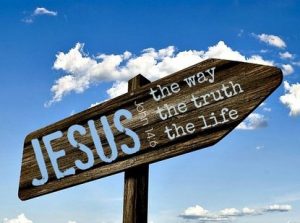
This Sunday’s Gospel reading tells us about God’s House and the way to this House. John the Evangelist presents this conversation between Jesus and His disciples before His Passion, but it is, nonetheless, a very becoming Easter text, for it is a wonderful reference to the Resurrected Life that Jesus is offering His followers.
Jesus knows about fear. He is perfectly human and perfectly divine, so He knows what it is like to be afraid. And how to overcome it too.
He starts by encouraging His followers to overcome fear. Fear is the real opposite of love. We normally think hatred is, but what is the ultimate source of all the hatred in the world? There is always the fear of losing something or even someone. We hate those that threaten to take something or someone from us. We cling to possessions, positions, prestige, relationships, and we do not realize that this prevents us from expressing real love. Real love is not possessive or self-centered. It is selfless and forgiving; it casts out fear because when love fills our life, there is nothing to lose, and we stop fretting about possessing. We do not need anything because we have it all.
This is what Jesus means when He encourages His disciples to believe in God and also in Him. Real believing is much more than sustaining an opinion. It means an inner conviction that is life-transforming. It means embracing the new life that follows the way of love, God’s and Christ’s way. There is no limit to the inclusiveness of this new way. There is unlimited room in God’s all-welcoming House.
Do we know the way? Honest and straightforward Thomas claims they do not. Philip insists that they must see the Father and then believe. After so many centuries of Christian following, we feel ashamed to declare that we do not know the way either, or that we want a tangible proof to believe. We feel inclined to condemn both Thomas and Philip. But are we there yet? Are we rid of fear and already living in the House of Love, in God’s and Christ’s House?
Following the Way of Love implies truth. We need to be honest to ourselves, to God and to others. We need to start by recognizing the truth of our fearful lives, our broken lives, our petty self-centered lives, and then move on to a new and plentiful life, the one that Jesus has shown us through His words and deeds, the only true life.
It is in that sense that Jesus is the way, and the truth, and the life. We get to know God’s love in the words and deeds of Jesus. His works transpire God’s infinite love. This is the only truth we should be concerned about. The irrefutable truth of God’s love. There is nothing philosophical about it. It just is. And real life is the product of that truth.
But following the Way of Jesus’ Love to the House of God is not about wonderful abstract love. Jesus is crystal clear about this, “He who believes in me will do the works that I do; and greater works than these will he do, because I go to the Father.”
How can we cast out the fear in the confusing times we are living right now? Jesus is the way. He is the truth. And He offers us the real life in God’s House of Love. But He did not mean any abstract way of being. He is commanding us to do His loving works, and greater works still. So let us set ourselves to the task. The time is now.
Fr. Carlos Expósito, Rector
|
RETURN TO TOP
We Shall Not Be In Want
This Sunday and Beyond - MAY 3, 2020
Get it in PDF form with calendar
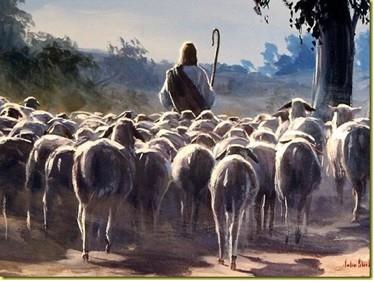
The Fourth Sunday of Easter always brings us the image of the Good Shepherd. The Gospel readings vary from Year A to C, but both Year A and B bring us Psalm 23.
There is hardly any person in the societies who have inherited the Judeo-Christian heritage who does not know at least a small part of this psalm. Why is that so?
This psalm is the comforting one par excellence. It is read to people who are going through serious illness or great material or human losses. It is read to the dying. Countless musical versions of it have been composed in almost every language in the world. However, there is a danger that we may think of it as what it is not. It is certainly not the equivalent of a calming mantra!
I remember a time when some calming meditation tapes became very popular in Cuba, my native country. They usually depicted a lake, a brook, a river, or even the seashore, where the beautiful sounds of water and birds were combined with a calming voice that guided people to a state of total blissful peace. In the midst of so much struggle even to find the needed food to keep the family alive, these tapes may have had a role to play then and even now. Maybe not only in Cuba, but all around the world. But the question is, do such induced states of mind really help us to face our reality? Do they transform us into better images of our Creator?
Psalm 23 has images of green pastures and still waters where God makes us rest, but its intent is very different from that of the meditation tapes I have just mentioned. The writer is assuring us of God’s infallible guidance and care, using a familiar image of the time: the shepherd. Notice that, as part of His guidance, God makes us rest beside still waters. He does not simply invite us to do so. It is a must. Sabbath was and is a must for the Jewish people. Rest is the starting point. We need to stop fretting about in life and rest in Him who, as the next verse says, revives our soul and then guides us through right pathways. So the resting part has a clear purpose: to renew, to revive, and to get us ready for the journey of life again, by following God’s right pathways, following His guidance and being assured by His infallible care.
The writer does not tell us that we are to remain in this comfortable resting place. What comes next is not a pleasing image at all: the valley of the shadow of death! A dark image indeed! But we are not alone there. God’s rod and staff guide us in such a way that we can overcome the fear of evil. Be aware that the writer is not telling us that God will prevent us from walking such dark places in our lives. He foresees our treading on them as a very real possibility. What he does assure us of is God’s unfailing guidance and care during such dark stages.
Then comes another troubling image. In the Jewish tradition, sharing the table with someone implied that there was some kind of communion or concord with those persons. However, here the writer tells us about spreading a table in the presence of those who trouble us; some versions say ‘in the presence of my adversaries’. Eating in the presence of our enemies? The common interpretation has been that God is showing our enemies that He is willing to give us his sustenance abundantly. That may be true. But the fact is that the act of eating in the presence of others may also be seen as a reconciling act. The anointing of the head with oil and filling the cup so that it overflowed was seen as an act of hospitality for special guests. It clearly means that God is welcoming us as His special guest in the banquet of life. Even in the midst of conflict, even when there are those who do not wish us well.
The last verse tells us about God’s goodness and mercy following us all throughout life. A common interpretation may be that everything will be smooth and great for us. But if we have read the psalm with critical eyes, this can hardly be a good interpretation. God’s goodness and mercy in our lives can only produce these same fruits in our daily behavior. Dwelling in God’s house clearly means doing His will, showing forth His love, mercy and reconciling intention. There is no way we can share in God’s life unless we are transformed by His Spirit into His image and likeness. After all, this is the reason why Christ became human, so as to bring us back again in communion with the divine, which clearly implies being in communion with one another and with the whole of Creation. When this longed for communion takes place, no matter how dark circumstances may be, as the psalm writer points out, we shall not be in want.
Fr. Carlos Expósito, Rector
|
RETURN TO TOP
When Shattered Hopes Give Way to New Life
This Sunday and Beyond - April 26, 2020
Get it in PDF form with calendar
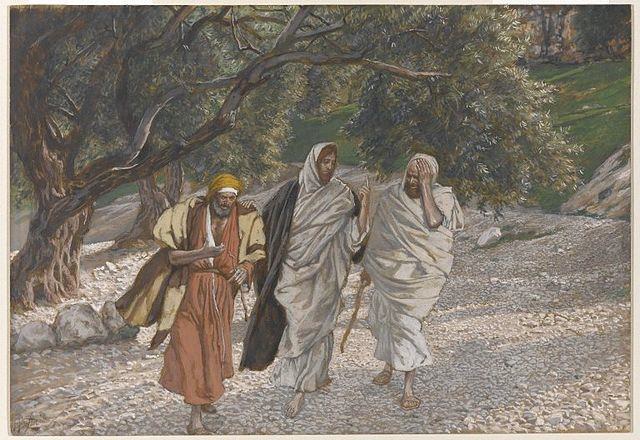
When dreams and high hopes are shattered, a deep sadness permeates our lives in such a way that our minds are obscured to everything but what we have lost.
It is hard to imagine a greater loss than what Jesus’ disciples felt after his crucifixion and burial. He had been announcing the coming of God’s Kingdom of love and justice, in which the captives would be free, the infirm would be healed and the dead would have abundant and everlasting life. For a nation living under imperial oppression, this announcement could also be interpreted as a liberation from the Roman Empire and the restoration of Israel’s glorious times.
And what had happened? The one who had been giving the wonderful signs of the coming of this hoped for Kingdom had now been killed by the authorities. Strange
rumors had been spread about the disappearance of His body and some women had even said they had seen Him alive. But who can believe such delusions?
Two of Jesus’ disciples were on the way to Emmaus, a village close to Jerusalem. Their mindset was fixed on their great loss, on the events that had led to their beloved Master’s unfair death, on how all their wonderful hopes had suddenly vanished like thin air. And then someone joined them on the way. And how absurd! He seemed not not know anything of what had happened in Jerusalem, so they started to tell Him. But this man, instead of showing sympathy for their great loss, rebuked them for their lack of faith, and used the Scriptures to open up a new light and hope for them. They felt their hearts burning with an undefinable certainty, but their minds were still blurred.
So, they invited Him to spend the night with them, because it was getting late and the roads at that time were not safe. They shared a meal and asked their guest to bless the food. He did so and broke the bread, and gave it to them. At that moment they suddenly recognized their Master. It was in the very act of blessing and sharing the food that the Resurrected Christ became known to them. He then disappeared from their sight, but they ran back to Jerusalem, their hearts filled with exultant joy, to share the wonderful news with the rest.
We are all living times of loss. Perhaps our losses cannot be compared to what these disciples felt they had lost. But it is a fact that the plans we had, the things we had foreseen would happen, have all shattered with the coming of this pandemic. Some have literally suffered the losses of beloved ones, and many have lost their jobs and financial stability. In the midst of all this, Easter is happening and the Christian Church is telling everyone about the Resurrected life. It would seem to be a bad joke, but it is certainly not. That is what these two disciples must have felt when this unknown companion began to rebuke them and quote Scripture. But then, suddenly, at the sharing of the meal, everything made sense.
Blessings, sharing, partaking. These seem to be the actions that changed everything for these two disciples. If it worked then, why should it not work now?
Let us not forget to bless God, even in the midst of pain, in the midst of uncertainty and sadness. Let us not forget to share our love, our time, our resources, with those who are in greater need and suffering. Let us partake of the blessings that God is still
providing us with, even if we are sad or unsettled by the situation. Then the miracle may again happen. Then the presence of the Resurrected one in our lives may become a reality, and overwhelming joy and the irresistible need to share the good news may drive us to proclaim: He lives! And because He lives, we also live!
Fr. Carlos Expósito, Rector
|
RETURN TO TOP
Our Twin Brother
This Sunday and Beyond - April 19, 2020
Get it in PDF form with calendar

On the Second Sunday of Easter, just after Easter week is over, the reading from the Gospel according to St. John brings us the events taking place just after Jesus was raised from the dead. The focus is now on Jesus’ closest followers.
What were they doing and what was their general feeling just after He was placed in the tomb? What are their reactions to Jesus’ glorious reappearance? How do these words addressed to His closest followers affect us after more than 20 centuries?
The first thing that the Gospel reading shows us is that the disciples were afraid. They did not want to be pointed out as Jesus’ disciples by the Jewish authorities. They did not want to partake in His fate. They feared for their own lives. And yet, there was still a sense of belonging that kept them united. They were gathered in the same place, but behind closed doors.
They had heard strange and disquieting rumors. Some of them had seen the empty tomb. Then, they heard Mary Magdalene’s and other women’s stories and later, the
story told by the two disciples coming from Emmaus. Something must have stirred some curiosity in them. If only that could be true. Their beloved Master come to life again! But no…that was just a vain hope…
And all of a sudden He appears in the midst of them. Closed doors could not prevent Him from piercing and shattering their fear, their doubts. Love conquers all that. His unbounded love brought them the true Peace that surpasses all common human understanding. Twice he greeted them with that Peace.
But He did much more than that. He totally recreated these disciples’ lives. He blew the Father’s Holy Spirit, which is also His, over them. And the Spirit is the life-giver. He was hovering over the waters of chaos at the beginning of time, creating all that is, infusing God’s will through His word. And now this same Spirit turned these fearful, doubting disciples into faithful followers - into the sent ones - into the forgiving ones - into the ones that would become the core cell of those who would spread His wonderful words and deeds of unconditional love to all nations, through all times.
The story about Thomas, which is a sort of parenthesis here, has led many to point this character out as the epitome of disbelief or doubt. But he was no greater disbeliever than the rest. The rest also believed because they saw. He was perhaps more honest and explicit about his doubts. And it is clear that he was the first to call Jesus “my God”. No reference to the reason why he was called “twin” is ever made in the gospels. Actually the name Thomas means ‘twin’. Could John the Evangelist be implying that he is actually our twin brother?
We are all like Thomas in many ways. We are full of doubts and feelings of uncertainty. Fortunately, when Jesus’ loving presence becomes a reality in our lives, we can also be as passionate and radical in our acceptance of His divine guidance.
The times we are living, like never before, make us wonder and doubt where God’s presence might be in the midst of our anguish. Even so, the reality we are experiencing has also made many of us come to the realization that life is valuable, that community is essential, that love is the greatest of treasures, and that the grievances that we may have against another are insignificant in the face of a pandemic that endangers us all and can only come to an end by a global and communal effort.
The Church is the living body of the Risen Christ. We are the sent ones. We have been re-created by the Holy Ghost to spread the wonderful news of life-giving love all around the world. Even if in times of uncertainty we are like doubting Thomas, let us also remember to be like him in single-heartedness, unrelenting passion and determination, and total acceptance of God’s guidance in our lives. By becoming Thomas’s twin brother, we also become Jesus’ twin brother, as he himself did.
Fr. Carlos Expósito, Rector
|
RETURN TO TOP
The Resurrected Life
This Sunday and Beyond - April 12, 2020
Get it in PDF form with calendar
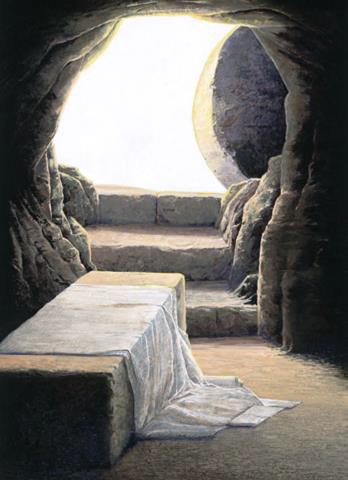
Easter is just around the corner and, to the retail industry’s misfortune, this year the Easter eggs, the bunnies, and other ornaments related to the Season will not be sold as profusely as usual.
But what is Easter really about?
Christians, I can hear you all saying, “Oh, come on, we know perfectly well it is about Resurrection.” So true. But what is this resurrected life all about?
With the advance of medicine, nowadays there are many people in the world that can undergo a “Lazarus-like” experience. People can be clinically dead for some minutes and then brought back to life. We are all familiar with the stories they tell about what they have seen and felt on the other side. And it is a fact that, for many of these people, such an experience brings about a significant change of attitude in their lives. They value their lives much more than before, and they come to realize what the real meaning of life is. Most of them have become better persons, so to
speak. But Resurrection, in the Christian understanding, is much more than resuscitation.
Let us then, imagine, for a moment, that all of a sudden we are all, those living and those who are dead, transformed into the bodies we had--without any defects, of course-- when we were, let us say, 25 years old. (There is a problem here, though, what about those who died as young children or before that age?) Let us imagine that these bodies are made up of incorruptible matter and they will not decay. No more sickness. No more death. Perfect climate and natural conditions for everyone. Perfect harmony with all other creatures and with one another. No more harm done to any creature.
This is an approximate image of what for centuries many Christians have thought of as the resurrected life in Christ. But there is a problem here. How can perfect harmony with our Creator, with one another and with creation be achieved? Can it be forced down on us? Can our minds be forced to have only loving thoughts, harmonious thoughts? Maybe. However, that would make us automatons, not the free creatures that God created. Is that the resurrected life we aspire to have? I hardly think so
So we have to admit that, unless we undergo a totally free and responsible inner transformation, Christ’s resurrection will be nothing to us but a beautiful story to be admired and told over and over again. But Christ did not die on the cross and rise so that we would admire Him. He did so in order to open the way of the resurrected life to us. A full and wonderful life that is not dependent on outer circumstances, no matter how critical they may be, but on our inner communion with Him, with one other, with the whole of creation.
This is the work of the Holy Spirit in us. There is no pretending we can do the work by ourselves. But we have been created free, so it is our prerogative to allow the Spirit to fill us up with His transforming power and bring us to the resurrected life that God has always intended for us to have.
Happy Easter indeed!
Fr. Carlos Expósito, Rector
|
RETURN TO TOP
Love in Fearful Times
This Sunday and Beyond - April 5, 2020
Get it in PDF form with calendar
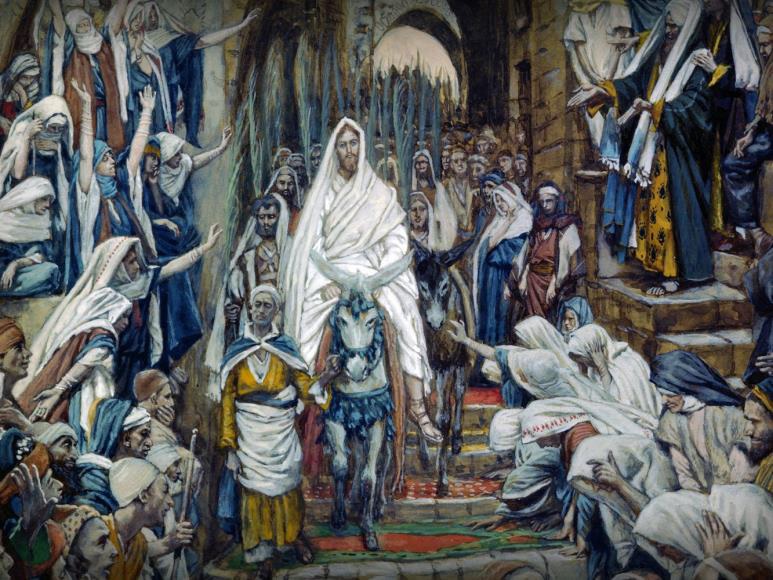
Holy Week starts this Sunday with the commemoration of Jesus’ triumphal entry to Jerusalem plus the narrative of His passion, crucifixion and death.
This will be a very different Palm Sunday. Instead of singing our ‘Hosannas’ in stark contrast to shouting our ‘Crucify Him’ in our churches some minutes later, we will be either following some live-streamed service from home or praying with the family, using the Book of Common Prayer, or some emailed bulletins prepared by our church.
Our lives are in the middle of some unexpected schizophrenia. The things we have been doing for years, even centuries, cannot be done at this time. This has been a rough Lent, and an even rougher Holy Week is coming. The death toll of this epidemic keeps on rising, and we will probably not start sighing in relief until after Easter Week. Fear is a common feeling pervading people’s lives now. Fear of contagion, of getting sick and dying. Fear of not being able to survive in the midst of the economic crisis. Fear that the world will not be like it used to be.
Even our faith is under fire right now. People who like to question God all the time find times like these particularly favorable for such questioning. And then we have to brace ourselves harder than usual and ask God to increase our faith. Some people may even mock us by asking: ‘What kind of God is this that makes it so hard for believers to celebrate His beloved Son’s passion, death and resurrection?’
But the events we commemorate during Holy Week are not any less schizophrenic than those of this time in which we are living. Think of it. The people who have witnessed or heard about Jesus’ prodigious works of healing, restoring, resurrecting, welcome Him to Jerusalem by waving palm branches and shouting Hosannas. Just some hours after that people join the Jewish authorities in shouting ‘Crucify Him’ and Jesus is condemned to die on the cross.
Were they the same people? Or maybe partially so? Some interpreters say they were different people. But no one can ascertain that some of those who shouted ‘Hosanna’ were not among the crowd that condemned Him to death. The fact is that fear of not being accepted by those in authority can make people do horrible things. We all know that. Fear is what prevents us from doing God’s will. Jesus says that true love casts fear away.
Understandably, these are fearful times. By using love to overcome fear we are imitating what Jesus did before his unfair accusers. Paradoxically, real love in a time like this is demanding that we keep physical distance and abstain ourselves from gathering to celebrate at church. It is not only ourselves we are protecting, but all others as well. We can still keep in touch and care for one another through electronic media. We can still use our ingenuity to commemorate Jesus’ triumphal entry into our lives, and be honest enough to recognize that there are times when our fear and lack of love crucify Him again. But Holy Week is just starting. It culminates in our Savior’s glorious resurrection. The victory is His and ours if we faithfully follow His Way of Love. Even in the hardest times. Even in schizophrenic times.
Fr. Carlos Expósito, Rector
|
RETURN TO TOP
Perceiving God's Grace
This Sunday and Beyond - March 29, 2020
Get it in PDF form with calendar

As I sit at my laptop writing this weekly reflection on Wednesday, March 25, 2020, the Christian world celebrates the Feast of the Annunciation. This particular celebration, however, looks quite different today. Churches are closed and the faithful are not allowed to assemble to pay their homage to the Blessed Virgin Mary for having been chosen and accepted to be the bearer of the Light of the World, of the God incarnate that would start the process of putting our world “right side up”, so to speak.
The Annunciation refers to Archangel Gabriel’s visitation to Mary, a young Jewish woman betrothed to Joseph, of the House of David. What Gabriel announced to this young woman was unheard of. She was to conceive of the Holy Spirit--God’s Spirit itself!--and the child she would bear was none other than the Son of the Most High, whom she would call Jesus, because He would come to save the world. Mary had questions, of course (who wouldn’t?) but the Archangel reassured her by insisting that what was happening to her was planned by the Most High, and she gave Him her unconditional acceptance.
We are all familiar with the way the story goes right after this. Of Joseph’s plight in accepting her due to her apparent adulterous condition. Of her visitation to her cousin Elizabeth and how she exalts her faithfulness and the privilege of being the
chosen one. Of Mary’s response to Elizabeth in that beautiful hymn which has come to be known as The Magnificat. Of the arduous journey to Bethlehem in her condition, and her giving birth to the Savior of the world in extremely unsuitable conditions…
But it all started with this Annunciation. When something unusual is announced we all startle and halt. It is like when we hear a fire alarm or the police siren on the road. Our mind is brought to a sudden halt and we pay close attention, even if we would rather not do it. Our routine is suddenly broken and we have to get ready for something totally different, sometimes even unheard of. What is announced may sound as something extremely good or extremely bad, but the fact is that from that moment on nothing is ever the same again.
These last weeks have been moments of annunciations. Things that were unheard of have been announced and, in spite of our not wanting to hear them, they have radically changed our lives. Unlike Mary’s willing acceptance, our acceptance has been a forced one. Nobody likes to be told that a pandemic is killing people and that unless we stay away from one another, it cannot be contained. We Christians do not like to be told that we cannot come together to worship, not even to celebrate The Annunciation of our Lord’s incarnation. But come to think of it, even though for centuries the Church has been celebrating this Annunciation, our world is, perhaps more than ever, upside down.
With the widespread use of social media due to the great technological advances, people are now more isolated than ever before. It is true that the world is more global because we can access information from everywhere at the wink of an eye. It is true that we can connect with practically anybody that has access to these technologies, but the sad truth is that, in general, people find it harder to connect physically and spiritually, to really be part of a community, to partake of their true joys and sufferings, of their innermost needs. The Church is called to be the body of Christ on earth, the foretaste of God’s real community, but unfortunately, even within the Church, some people tend to gather in family groups only and keep a distance from one another. The real sense of communion is lost.
So, what is this new virus doing to our lives? Apart from the sad fact of killing people and disrupting people’s economy, it is doing nothing but giving us an extreme picture of the physical and spiritual disconnectedness that our society already has.
We have been forced to stay physically apart from one another, not to visit one another, and to connect only via technology. Isn’t that just more of what we already had? It is like a big bell ringing, announcing, saying to us: “this is an extreme version of the world you are so fond of; how do you like it now?”
It is not technology that has done this to us; it is the way we are using it. In times like these, technology can help us to keep connected, to show how much we care for one another, to pray and worship together in spite of all inconveniences. Families can be better connected now that they have to spend most of the time together. We can still grow spiritually in the midst of the pandemic. We can still react and come to realize how much we miss being with our coworkers, our classmates, our neighbors, our fellow parishioners. We can still realize the importance of real community in our lives. Then the Annunciation of the coming of our Savior to the world will have a renewed sense, and we, following on our Savior’s footsteps, will also take active part in making this world “right side up”.
Fr. Carlos Expósito, Rector
|
RETURN TO TOP
Perceiving God's Grace
This Sunday and Beyond - March 22, 2020
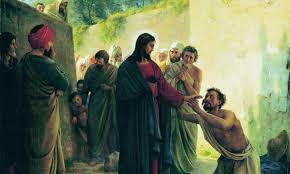
In this Sunday’s Gospel reading, the question the disciples ask Jesus is related to the reason for a man’s physical blindness. In this case, it is a man who was born blind, so the disciples wonder whose sin is to account for this condition, his or his parents’. That was the usual way the cause of disease or birth defects was explained by the Jews in Jesus’ time.
But Jesus’ answer falls into a totally different category. He directs His disciples’ attention away from the cause-effect chain and into the realm of God’s healing Grace. He heals the blind man using the resources provided by His own body--saliva--and the body of the earth--soil and water, probably with the intent to express that we have already been given all we need to heal and restore our lives, as long as we align ourselves with the true source of life: our loving Creator.
The story that unfolds after this blind man was healed is one that clearly shows how religious people (like ourselves) may react in the face of God’s restoring power. Instead of praising God and the Son of Man who has brought the blessing of sight to this person, those religious leaders try to find an “explanation” for what is subverting their beliefs. They first try to discredit the healing by pretending that the man who can now see is not the same man who was born blind. When they can no longer hold this view, due to the overwhelming evidence to the contrary, they try to discredit Jesus as the healing agent, and even accuse Him of being a sinner.
The reaction of the man who was born blind, however, is one of deep gratitude and recognition. Despite having been born blind, he can now see, not only with his physical eyes, but with the spiritual ones as well. He understands that the person who healed him can only be God’s sent one (Siloam, the name of the pool where he washed his eyes, means “sent”).
Finally, as these religious leaders fail to make the healed man agree with their distorted and blind positions, in their irrational rage they try to hurt him by retorting that he was born in sin and expel him from the synagogue. Being expelled from the synagogue was equivalent to being deprived of one’s identity as a Jew. So much was the blindness of these religious leaders that it totally prevented them from perceiving God’s Grace in action.
The time we are now living is disruptive of our cherished routines. It is totally putting our lives upside down in many respects, including the religious sphere. This new epidemic is bringing about life losses, which is really sad and causes a lot of pain to all those affected. But it probably does not kill more people than other diseases that have been around much longer. The great difference may be its capacity to spread at a remarkably fast rate. It is extremely contagious. And its resemblance to a common cold in its early stages and the mild way it affects young and healthy people makes it even more difficult to detect and isolate. So, governments are taking extreme isolating measures for the whole population in order to halt its rapid spread.
Many businesses are being affected by these measures. Schools have been temporarily closed down and churches are not allowed to hold their services any longer.
We may well be wondering, like Jesus’ disciples, if all this disgraceful state of affairs is the result of our own sins or that of our predecessors. We always want “explanations”, especially religious ones, that make us feel in control again. But just like Jesus’ disciples we may be missing the whole point. What if instead of looking at a cause-effect chain we look forward to God’s Grace?
But what could be the grace in a situation like this one? It is all so hard, so sudden, so disruptive, so fearful, so painful. We Christians will not even be able to assemble to celebrate Holy Week!
Every year we say Lent is the time to turn to God. But have we really turned? To what extent has our life been transformed into Christ’s likeness? What if now God is giving us the real opportunity (perhaps rather giving us a major push) to really change? We are being forced to quit our habits and live in a different way. Families are forced to reconnect with one another, including children, because they now have to spend more time at home. Instead of going out to restaurants or bars, people are now going to the beach or open spaces; they reconnect with nature and the whole family shares that time together. By striving to find new ways to be present for one another, even when personal distance is a must, we may become more aware of the blessing of communion, of being a community in mutual care and love. By worshiping our Creator in innovative ways, we may even find a deeper spirituality within ourselves and others. As Jesus told the Samaritan woman in last week’s Gospel reading: “the time comes, and now is, when true worshipers will worship the Father in Spirit and truth”.
God’s healing Grace is always moving among us, even when we can hardly perceive its effects. Surely, we want this epidemic to end. It will end and we will go back to our cherished routines. But in the process, we will have learned something. God’s Grace may have opened our spiritual eyes to a new reality, and that is something no one will ever take away from us!
Fr. Carlos Expósito, Rector
|
RETURN TO TOP
The Fountain that Quenches Our Thirst
This Sunday and Beyond - March 15, 2020
Get it in PDF form with calendar
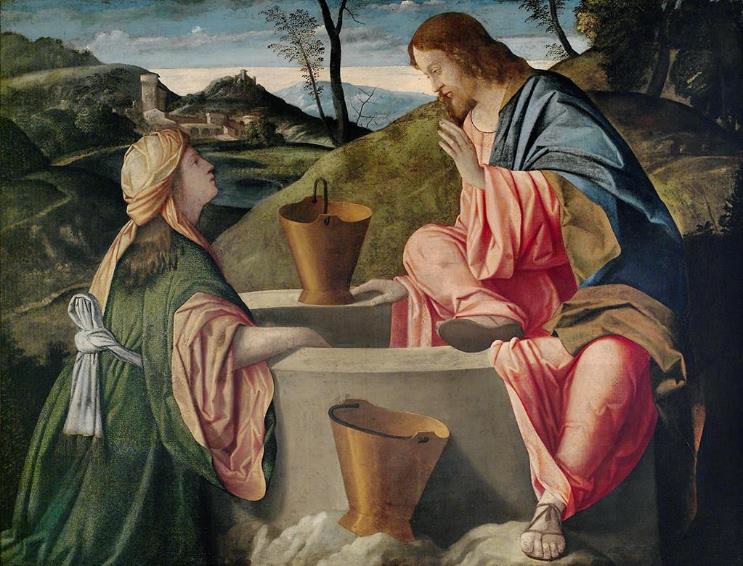
Thirst is the physical sensation that drives us to drink water in order to rehydrate our bodies, which are made up of about 60% of this precious liquid. Those who have experienced severe thirst know how persistent and unbearable this sensation can be, so it is a good image for our inmost spiritual needs. “My soul thirsts for you”, says the psalmist referring to God.
As human beings, we have essential biological needs, but we also have spiritual needs. Our main spiritual need can only be satiated by our full communion with our Creator, but unfortunately it takes most of us some time to realize that truth. In the meantime, we wander through life looking for different wells where to satiate our thirst. Some of these wells can give us a water that may temporarily satisfy us, but we will soon thirst again.
Some of us strive to drink from the well of material possessions, but we all know the vicious circle: the more we have, the more we want. Others may go after sensual pleasures, with the same disappointing result. We can even drink from the well of human relationships based on the recognition of talents and human knowledge. That can be a quite satisfying water for some time, but will never quench our thirst in the end. Even relationships based on human love, which are highly commendable, although they will temporarily quench our thirst and make us feel fulfilled, will eventually point us to a deeper well, the fountain of unconditional love, the source of all human love, which is God Himself.
The Samaritan woman who talks with Jesus by Jacob’s well needed water and so did Jesus. But Jesus perceived the deep spiritual thirst in her. So He initiated a dialogue that led the woman to open her thirsty life to Him. She had had five husbands and the man she had now was not even her husband. She had longed to quench her thirst in human relationships, but they had failed to give her what she had expected. Who knows why she had been married five times. Divorced? Widowed? Or a combination of both? And the man she had now was not even legally committed to her. But now Jesus was offering her a different kind of water; one that would spring forth in her for everlasting life; one that would quench her thirst for ever.
At the beginning she misunderstands Jesus’ offer. She thinks He is talking about physical water that would magically quench her thirst so that she would not have to drink water again. If we think about the long distances people had to walk at that time to get and carry water that would have been a very good offer. But later she realizes that this man talking to her is a prophet, and perhaps the Messiah, so her soul is suddenly filled with an inner source of life, a different kind of life, full of hope, certainty, and love. And she cannot keep it to herself. She goes out to tell everyone. She becomes a witness to Him who transforms her life, who gives her the only water that quenches her innermost thirst for ever more.
May we go after the true fountain of everlasting life that our thirst may be quenched, and may we also become witnesses to Him who is the true source of this living water.
Fr. Carlos Expósito, Rector
|
RETURN TO TOP
Being Born Anew From Above
This Sunday and Beyond - March 8, 2020
Get it in PDF form with calendar
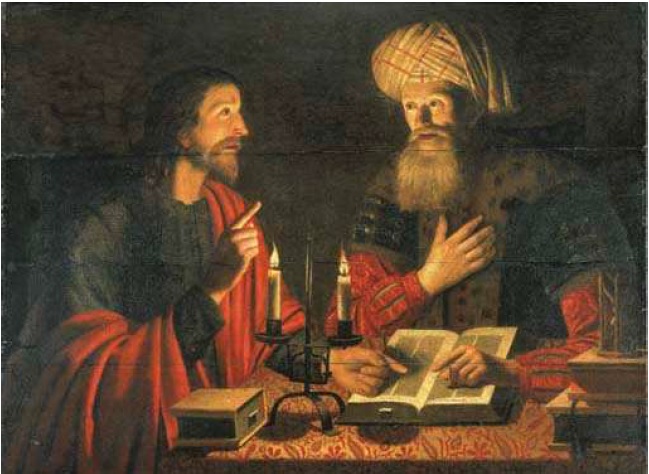
In the conversation between Nicodemus, the master of Israel that visits Jesus in the night, and Jesus, the former is bewildered by Jesus’ remark about the need to be born anew and from above in order to see God’s Kingdom.
The word used by Jesus to describe this kind of rebirth can be used in the original language with both meanings: ‘anew’ and ‘from above’. Nicodemus seems to understand (or pretends to understand) the first meaning, relating it to the physical aspect and thus making it look outrageous. Jesus is clearly referring to the second, in relation to the Spirit, but both meanings can be understood as being begotten as a totally new person by our Heavenly Father.
Nicodemus was probably annoyed because Jews were supposed to have already been regenerated, and being Abraham’s descendants already assured them entrance to God’s Kingdom, which was understood as a reward for being part of God’s chosen people. That reward was especially assured to those like him who were faithful in fulfilling the Law.
Jesus shatters all this with his insistent remark about the need to be reborn from water and the Spirit; from purifying regeneration carried out by God’s Holy Spirit, not by any person’s will, as in the case of natural birth. His image of the wind blowing from and to any direction, without our knowing or controlling it, but with obvious effects, to describe God’s Spirit, is a clear indication that this process of total regeneration can only take place by the Spirit’s initiative, by virtue of God’s gracious love, and not by us.
The only thing we can and should do is look to Him who offers this gracious salvific regeneration to us. Just as those who looked to the brazen serpent lifted on the pole were saved from dying from the serpent's bites, those who looked to the uplifted Son of Man would have eternal life.
The uplifting of Jesus, He who is true man and true God in one person, can refer to the moment he was crucified and lifted on the cross. At that moment He gave Himself totally to save the world. It was the utmost demonstration of God’s unconditional and undeserved love for the whole world. It also refers to glorification because there is no higher glory than this unmistakable proof of God’s love.
Nicodemus probably left Jesus’ place that night with a mixture of anger and bewilderment. But later in John’s Gospel (Chapter 7) we find him attempting to defend Jesus. And at the end of this same Gospel we find him again, with Joseph of Arimathea, spending a huge sum of money in spices to anoint Jesus’ body after His death.
The Spirit blows where it wishes, and with some of us its transformational regeneration may take time. But when we finally realize that there is nowhere to look for whole and eternal life but in Jesus, when we surrender our futile search for meaning elsewhere and look up to Him at last, then the regenerating breeze begins to blow in our lives, and we are eventually begotten anew by our Loving Father.
Fr. Carlos Expósito, Rector
|
RETURN TO TOP
Firmly Rooted in God's Word
This Sunday and Beyond - March 1, 2020
Get it in PDF form with calendar

As we start our Lenten journey towards Jesus’ passion, death and glorious resurrection, we feel we need to engage in spiritual disciplines that will help us along the way. We intentionally try to break away from routine to open spaces for more inner reflection, often accompanied by the abstention from certain foods and habits, and a lot of prayer. At the same time we engage in the practice of giving more generously to those in need.
But when we break away from our busy agendas, often filled up so there is no time for being with ourselves, we enter our inner world, and that can be frightening. When we are left alone with ourselves, our mind will start to talk. The mind fears silence. It is not used to it. It wants to be active all the time.
Not all the thoughts that come to our mind are good nourishment for the spirit. Some of them can be misleading indeed. It is not my intention here to defend a certain position as to the origin of this kind of thoughts. As an Anglican, I am free to believe that they can come from an evil spiritual realm, from our subconscious mind, or a combination of both. Whatever the origin, the vital issue to consider is whether we let them take over and lead us to act under their influence or not. “Lead us not into temptation, but deliver us from evil”, as the Lord’s Prayer states.
This is what happened to Jesus when, in preparation for His earthly ministry after being baptized, after having been assured of His divine kinship, He is led by God’s Spirit to spend time with Himself in the wilderness. He fasts for a forty-day period and then feels famished. At that critical moment, when our being is most vulnerable, evil thoughts can easily creep in.
When we think of evil, we usually tend to think of acts that harm or take away other people’s lives. But evil thoughts usually disguise themselves with intentions that may even appear good at first.
Jesus felt the temptation to quit his fast, and to satisfy His immediate needs using some of His divine power. He was also tempted by the convenience to have absolute dominion over the world if He simply gave up His determination to serve only God; and even by a feeling of spiritual pride and superiority that would make Him invulnerable to physical harm. But in all cases he used an infallible weapon that made Him come out victorious: His deep knowledge of God’s Word as it appears in Holy Scripture. There was an instance when the evil one used a passage taken from Scripture to convince Him, but Jesus showed that He knew Scripture in integrity, and He let the Holy Spirit discern its real intention.
Jesus Himself is God’s Word. John tells us at the beginning of his Gospel that He is God’s Word incarnate. The evil one was a fool when he tried to use the Word to deceive Him who is the Word.
We have the Holy Scriptures as the most powerful weapon against all evil thoughts that may creep into our minds during our meditation times. But remember that the evil one can use detached passages of Scripture for evil purposes too. Let us carefully and prayerfully consider the intention of each passage, taking it as part of a whole, whose final purpose must always be to lead us to Jesus, the Word made flesh. Being firmly rooted in God’s Word, our Lenten journey is spiritually safe and fruitful.
Fr. Carlos Expósito, Rector
|
RETURN TO TOP
Unattainable Goals?
This Sunday and Beyond - February 23, 2020
Get it in PDF form with calendar
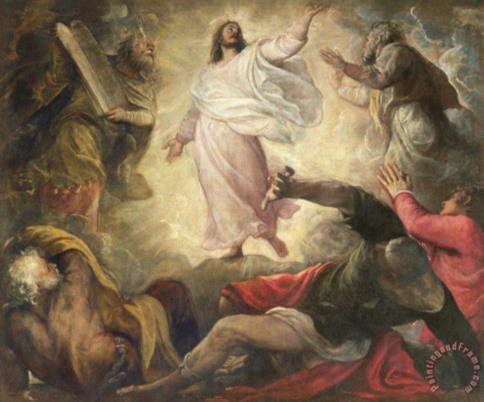
The last Sunday after Epiphany is like the hinge between this season of the manifestation of Christ’s Light to us, and Lent, the season that calls for our transformation in that Light, our death to sin and a senseless life and the rebirth to a new abundant life in God’s Love shared by all. For that reason, this last Sunday always brings us the passage of the Transfiguration of our Lord.
The transfiguration of our Lord Jesus is usually perceived as an event, as something that happened to Jesus on that mountain and that only three of his closest disciples were able to witness. It was accompanied by the presence of the main representatives of the Law and the Prophets (Moses and Elijah), and by a voice declaring Jesus’ divine nature, just as when Jesus was baptized at the Jordan River. The transformation is depicted as a dazzling light radiating from Jesus’ face and his whole being, a glorified version of the Jesus that the disciples had been walking with all this time.
But then, one may wonder: was only at that moment that Jesus showed his divine affiliation before He was raised from the dead? Did He not also show it every time He spoke about His Father, every time He announced the good news of salvation, healed, restored lives and resuscitated the dead, fed the hungry and reassured the broken ones?
There is one more detail about the transfiguration narrative that we may have missed. The voice addressed the disciples directly. The voice said, ‘Listen to Him.’ So perhaps the transfiguration is not so much about Jesus, but about those three who were with Him at the mount. They were transformed. They had been with Jesus for some years now and had witnessed the signs of God’s reign that He gave. Not only that, they had also been given the power to give those signs. So they were able to see who Jesus really is, how His life recapitulates the Law and the Prophets, how He is glorified by the Father because all His life glorifies Him.
And they heard God’s command to follow Him, to become Him, to incarnate Him in their words and actions. What they witnessed was not only who Jesus really was but who they really were.
We become what we are. The caterpillar is the butterfly even before the metamorphosis. All those structures that unfold so beautifully after it comes out of the cocoon have always been in it even if they are not visible then.
We are all God’s image. We may not show it fully at some stages of our lives, but when we are finally ready to hear the voice loud and clear, the voice that tells us to listen to Christ--God’s perfect human image--then we begin to be transformed, transfigured; our lives start to show God’s glory, and we definitely shine with the dazzling light that shows God’s infinite love for all.
Fr. Carlos Expósito, Rector
|
RETURN TO TOP
Unattainable Goals?
This Sunday and Beyond - February 16, 2020
Get it in PDF form with calendar
When we read the excepts from the Sermon on the Mount that the Lectionary brings us for this Sunday, we may get the impression that what Jesus is asking His followers is simply unattainable. Let us be honest. Who has not been angry with brothers or sisters? Who has not called them bad names now and them? Who has not lusted with an attractive person in their mind?
The very idea of plucking out an eye or cutting off a hand if these parts of our body cause us to sin is too extreme to even consider it seriously.
So why is Jesus using this extreme language? Is He perhaps discouraging everyone from trying to follow Him? Or just warning us how inadequate we all are for God’s kingdom?
Let us consider the different sayings carefully and then maybe we can get a better idea of His real intention.
In the first part He refers to anger, resentment, and insults among members of a family or community. All of these are attitudes and actions that disrupt the community; they kill the community, they dissolve it, so their effect is in some way comparable to the physical act of taking a life. He then talks about the inefficacy of carrying out ritual offerings if these disruptive attitudes and actions are not mended. He insists on reconciliation as the only acceptable form of offering to God to atone for these acts.
Next He talks about the real impact of our thoughts in our lives. Thoughts are the seeds of our actions, so if our thoughts are opposed to what keeps the community together--thinking of a person as a means of satisfying our sexual desires only, without considering their real value or that person’s attachment to another person. For instance, that can also destroy the community. All that could be done to prevent us from inclining to such destructive thoughts is worthwhile doing. The plucking out of eyes and cutting off of hands is an extreme image, of course, but such images were often used by Jesus to make His point unmistakably.
Finally He makes reference to the practice of oaths. After all, why do we need oaths? Is it not because our ordinary statements are not always true? The need of oaths is an indication of our lack of consistent truth in our words, in our everyday speech. If we normally always spoke the truth, swearing would make no sense at all. No real community can be formed on the basis of untruth. A loving community, the one that Jesus is trying to make His followers conform to, is based on truth. ‘Truth will make you free’, He said.
The goals of God’s kingdom are certainly high and hard to attain. Jesus wants us to understand that we are a long way from being the ideal members of a community based on God’s all-inclusive and unconditional love. When we understand this, we are more willing to depend on His grace and the Holy Spirit than on our own achievements. And we are always given the opportunity to be reconciled, to be forgiven and to start anew. So there is no reason to despair or give up. There is always hope and blessing in Jesus’ way, the excellent way, the Way of Love.
Fr. Carlos Expósito, Rector
|
RETURN TO TOP
Do We Flavor the Earth?
This Sunday and Beyond - February 9, 2020
Get it in PDF form with calendar
If asked who we are, most of us would refer to our names, parents, perhaps local or national origin or even occupation. Probably no one would say, “I am the salt and light of the earth”. However, that is precisely what we are, according to Jesus.
After Jesus mentions the beatitudes or blessings for the heirs of God’s kingdom, he clearly states the mission of those belonging to this reign.
The first one is to be the salt of the earth. Salt in Jesus’ time was extremely valuable. It was not only used to give flavor to food, but also to preserve it from corruption, from decay. But salt at that time was sometimes contaminated with other minerals, and then it became useless. It would lose the capacity to flavor and preserve.
When Jesus used this image He was probably referring to both uses of salt. If we are to bear witness of God’s loving reign on this earth, then we must clearly show the signs of this reign in our lives. These signs give the world a very distinct flavor, the flavor of compassion, forgiveness and acceptance in opposition to the dull and bitter flavor of indifference, spite and intolerance that is so common on this earth; the flavor of concrete and effective self-giving love instead of the pungent widespread flavor of selfish ambition. The earth desperately needs this change in flavors. And we have been appointed by Jesus Himself to be the agents of this change.
We are also called to be preservers of the good flavors. We should not let them be corrupted or contaminated in such a way that they are no longer tasted. Just as a pure grain of salt is clear and transparent, so must our lives be in showing Christ’s Love for all in this world.
Then the second mission follows. When we are effective agents of these new flavors for the world, God’s Light shines in us. It inevitably irradiates from us to all. There is no way we should or could hide it. But it does not shine to glorify ourselves. Jesus makes that clear. It shines only for God’s glory, so that others can see God’s wonderful love reflected in our good works towards humankind and creation.
When we read these things, we might think Jesus is referring to some ideal goal that we are to pursue. But no, He clearly says, “You are the salt of the earth” “You are the light of the world”. There is no becoming here. There is being. This is what we already are. Being aware of this affirmation can help us to act in the world according to who we really are.
If asked about our beliefs, our convictions, our conception of life, most of us would readily say, “I am a follower of Jesus” “I am Christian” “I believe in Christ’s redemption”. If this is the case, there should be no hesitation in answering, “I am the salt and the light of this world”.
Let us be this salt and this light. Let us flavor the earth and dispel the darkness of this world. The earth is in dire need of it. Let us not delay.
Then our righteousness will certainly exceed that of the scribes and Pharisees of Jesus’ time, and the kingdom of heaven will definitely be ours to share.
Fr. Carlos Expósito, Rector
|
RETURN TO TOP
The Cost of Bearing the Light
This Sunday and Beyond - February 2, 2020
Get it in PDF form with calendar
Candlemas is the feast of the presentation of our Lord Jesus Christ in the temple, and is observed on February 2nd, forty days after Christmas, to conform to the tradition as it is narrated in Luke’s Gospel. Placed in the midst of the Season after the Epiphany, it has been linked to the manifestation of God’s Light to the whole world thanks to the words of Simeon, the old man who took the baby Jesus in his arms and said, referring to Him: “…a light for revelation to the Gentiles, and for glory to your people Israel.” So the church uses blessed candles in procession as part of this day’s liturgy, to underscore that we, His followers, are now the bearers of this Light as well.
The encounter between the Holy Family, and both Simeon and Anna the prophetess, was full of joy and blessing. Simeon had been waiting for this glorious moment all his life and even declared that he might now depart from this world in peace after witnessing the Lord’s salvation. Anna, an old prophetess that worshiped with fasting and prayer at the temple night and day, gave thanks to God for the Savior that she had been able to see. Both Joseph and Mary were marveled at these auspicious words about Jesus, but there are some other words coming from Simeon that we should never overlook.
After he blessed Jesus’ parents he said to Mary:
“Behold, this child is set for the fall and rising of many in Israel, and for a sign that is spoken against, that thoughts out of many hearts may be revealed.”
Children grow, and Jesus would be no exception. As full of tenderness and peace Christmas may look, there is always the fact that God’s incarnation has a very definite purpose. This child, the Christ, the Messiah, had a mission to fulfill. He was to show in words and deeds what God’s will is for His people, and this would bring about clashes with the religious and civil authorities, and with those in the high positions of society. His unlimited love for the destitute and the despised of society was not well received by those in power. His breach of the tradition in favor of God’s mercy and love when it came to healing and giving life was not well received by the scribes and law interpreters either. They hated Him. They were conscious or perhaps unconscious agents of the forces of evil, the dark forces. He was a threat to the status quo. They put Him to death. But death could not restrain Him. He conquered death and all evil forces and opened the way for us to do the same. After all, He is the Light, and as John the Evangelist put it, darkness cannot overcome it.
Even so, Mary was then warned by Simeon how much she would suffer as the mother of the Messiah. “And a sword shall pierce through your own soul also”, he said to her.
Our blessed Virgin Mother Mary went through a lot of suffering. She suffered rejection and harsh conditions before Jesus was born and she went through intense suffering when He was rejected by those who opposed His mission and was even crucified for fulfilling it. But there she stood by Him, as the first follower and promoter, and was faithful to His mission to the end of her earthly life. She is definitely worthy of our veneration and deep respect, and she is the most dignified bearer of Christ’s Light.
Bearing this Light, as we will do in procession this Sunday, is a privilege and a blessing. But Light bearers, when their light is genuine, will always find opposition from those that belong to the dark side. These may be very real people with powerful positions and they may also be invisible powers siding with the evil forces of darkness. Genuine Light bearers will find suffering and obstacles along the way, but as Jesus said in the Sermon of the Mount, “Blessed are the pure in heart for they shall see God”. Purity in heart means, above all, singleness of intention, and honest commitment to that intention. When bearing God’s Light for the world becomes our intention and commitment, no matter how much we may suffer, we are the most blessed of creatures indeed!
Fr. Carlos Expósito, Rector
|
RETURN TO TOP
Casting Our Nets Elsewhere
This Sunday and Beyond - January 26, 2020
Get it in PDF form with calendar
In Matthew’s Gospel the first four disciples that Jesus calls were two pairs of brothers. They used nets to catch fish in the Sea of Galilee and they made their livelihood out of that occupation. When Jesus calls the first two he makes the following invitation: “Follow me, and I will make you fishers of men”. As strange as that invitation may have sounded, they did not hesitate to leave their nets and follow Jesus. We may wonder what made them leave their subsistence means behind to follow this stranger. Some have suggested they may have already heard about Jesus or even met Him before. Some have stressed the persuasive power of the Holy Spirit that filled Jesus as responsible for these men’s prompt response. We do not know for certain, but we do know that this moment totally changed their lives.
We spend most of our lives trying to catch different things or even people. We try to catch the things that make our lives pleasant and comfortable. We try to catch positions that make us feel appreciated and “important”. We try to have with us the people that will solve our problems, ease our minds, and stand by us when in trouble. In that sense, we are like fishermen casting nets all the time. Sometimes we get the “fish” we want. Other times we don’t, and cast them again and again. The main purpose of those net castings is to satisfy our needs. It is a self-centered casting of nets. And no matter how full the net is, it never satisfies us.
Matthew’s Gospel, on the other hand, points out to a different kind of net casting. It tells us to become fishers of people. The idea is to get people out of their ordinary lives of self-centered, useless net casting, and take them to a different realm. When fish are taken from their aquatic medium to a terrestrial one, they simply die because they cannot make use of the oxygen in the air; they can only take it from the water. However, when people are “fished” in the sense that Jesus implies here, they are taken from a stifling form of self-centered life that cuts them off from the real source of abundant life--God’s self-giving life--into a form of life that is centered in others, and is therefore much more like God’s life itself.
It may seem paradoxical, but when we move away from ourselves and toward the rest of our fellow human beings and all creatures in general, we start to be connected to the Creator’s intention, which is always loving and self-giving. Then we begin to feel the satisfaction that comes from the source, and the Kingdom of Heaven becomes a real possibility.
Matthew’s Gospel is clear in this sense. Jesus’ call to the first disciples starts with a radical change in net casting, and the last words in this Gospel, which have come to be known as The Great Commission, tell us to go and make disciples. It is not an easy task. People resist being taken out of what they think is their true life and onto the unknown. But Jesus has also given us a promise: “I am with you always, even unto the end of the world”. With His assurance, we can start to cast our nets elsewhere.
Fr. Carlos Expósito, Rector
|
RETURN TO TOP
Beholding and Pointing to Christ
This Sunday and Beyond - January 19, 2020
Get it in PDF form with calendar
This morning, as my wife and I were taking the elevator in our building, someone was hurriedly carrying some bags and we held the elevator door for this person to come in. We have seen this person, who usually seems to be in a hurry and never seems to notice anything or anyone, several times before. This person’s focus seems to be the workplace and how to get there on time.
But are most of us any different? Do we ever stop and behold the person who is in front of us, beside us, near us?
John the Baptist told his disciples to behold the Lamb of God, the Messiah, the Christ. Not just to have a glimpse in passing, but to stop, to focus, to be present to the moment, to perceive with their whole beings. This man was probably a total stranger to them, but John knew that He was the one who baptizes with the Holy Spirit, not himself, who had been baptizing in the River Jordan, calling people to repentance, and now had some disciples who were willing to follow his call.
But John is not jealous. He knows what his mission is and sees it accomplished now. He even prompts his disciples to go after the true Messiah. And so do some of them.
The disciples go after Jesus and He invites them to “come and see”. And they spend the night with Him. They need to behold, to be totally aware of who this unknown Messiah is, what He does, and the way He lives.
As Jesus’ present-day disciples, do we behold Him or do we simply take Him for granted? Do we pause to ponder on His love, His message, and His deeds? Do we feel His continuous presence in our lives? Are we aware of how He feeds us with His real presence when we partake of the bread and wine in the Eucharist? Do we feel how He upholds us through every hardship in our lives?
But even though He is the Christ, the true Son of God, He does not point to Himself, but to the Father, and to “the little ones”. That is the way He calls each and every person in this world, because we all need to be nurtured in God’s love, just like children need to be nurtured by their parents. So if we are to follow Jesus’ Way of Love, we should behold the Creator and His creatures, especially our fellow human beings, who need to be nurtured in love, just as much as we do.
And we should not feel jealous because we are not the focus of attention. The proclamation of the Good News is not about any one of us being in the spotlight, but about the Lamb of God, and this Lamb offered Himself in sacrifice so that all, without exception, may have life and have it abundantly.
Our mission is a reconciling one. We must feel the need to nurture every person in God’s overwhelming love, the only true life. But first we need to learn to behold Him that gives that life and to point others to Him through our daily words and deeds.
Fr. Carlos Expósito, Rector
|
RETURN TO TOP
We Are God's Beloved Ones
This Sunday and Beyond - January 12, 2020
Get it in PDF form with calendar
In an era where modern technology has made communication with others so easy, there is more isolation, neglect and lack of real love than ever. The fact is people do not really post in social media who they are, but they try to present a fake picture of themselves that is ‘attractive’ or at least ‘acceptable’ to others. People feel the need to be loved, but they have forgotten how to feel and share love.
The inability to show authentic love is closely connected to a feeling of not being loved. We have been made to believe that in order for others to love us, even the members of our own family, we need to make certain achievements that earn us that love. That leads us to compete with one another, to try to be the strongest, the ablest, the most popular and the most efficient. Then, and only then, we tend to believe, will we earn people’s ‘love’. So if someone is selected as the ‘loved’ one, it necessarily means that others are excluded from this ‘love’.
When it comes to our relationship with God, we tend to believe that the same rationale applies here. We believe that we have to accomplish certain tasks and conform ourselves to certain prescribed behaviors in order to be worthy of God’s love. And if it happens that someone is selected as God’s beloved one, it means that others are excluded from that category. So according to this, God must have declared Jesus as His beloved one after He accomplished His mission on earth. And then, again, all others who could not live up to His accomplishment were excluded from this category.
But is that the way things happened?
Not at all. What we read in Matthew’s Gospel is that God called Jesus His beloved one in whom He was highly pleased right before He actually started His redemptive mission on earth, at His baptism in the Jordan River by John the Baptist. In fact, it must have been highly reassuring for Jesus to hear these words when we think about the magnitude and sacrificial mission He was to face. He had to pour out a tremendous love to all those surrounding Him, and He needed to be filled with this love from His father in order to be able to do so. We cannot give to others what we lack.
Jesus came so that we might get to know God’s love for us all. That was the core of His teaching in words and in deeds. He showed us how real love is not diminished when shared, but simply multiplies infinitely as did the bread and the fish. He showed us how God’s love for Him does not exclude but is intended to include us all. Not that we need to earn God’s love, but simply perceive it, accept it, rejoice in it, and multiply it by sharing it with as many others as we are able to.
And the words that Jesus heard at His baptism are meant for each and every one of us. Simply because God loves us in spite of our disbelief in His love. So next time you have any doubts about deserving love, about being filled with love to share and multiply, remember these words, say them once and again silently or out loud, with absolute certitude and deep faith, to yourself: N, you are my beloved one, in whom I am well pleased!
Fr. Carlos Expósito, Rector
|
RETURN TO TOP
Can We See The Light?
This Sunday and Beyond - January 05, 2020
Get it in PDF form with calendar
For those who were born blind or have gone blind due to certain conditions, the question may sound inappropriate, almost sarcastic. However, throughout my life I have met physically blind people who can actually see more than some with a 20/20 vision range. These people are blessed by an inner light that enables them to shine in the darkness of this broken world and guide others through the apparently illuminated pathways of their lives. They do not let their physical darkness embitter them. Their faith and commitment to devote their lives to illuminate others surpasses all. I have always admired such people. They can be a real inspiration for those of us who have very good physical visions and are always complaining about the hardships of life.
But can we see the Light? The one that John the Evangelist describes as the Life of this world? The one that shone in the middle of the night for the shepherds keeping watch on their flock on Christmas Eve? The one that the wise men from the Orient followed so as to be guided to the presence of the child God? This is none other than the Light of Christ, God’s Light. This Light wants to shine for all. It really wants to shine, so that the darkness of ignorance, prejudice. Intolerance, selfishness and indifference can be dispelled from our lives, so that we can all be healed and have abundant light and life in us.
This is not the light reflected by lentils covering the garments of worldly celebrities. King Herod and his courtiers may have had that light, but they never saw the real Light. Some wise men had to come all the way from the Orient, from a foreign land, with a different religion (that of Zoroaster’s maybe) to point out to them that the Light of God was already shining in their land! And then Herod tried hard to put out the Light. But as John the Evangelist proclaims: the darkness cannot overcome it!
This Light shines on and will continue to do so. Dark forces have tried hard to put it out, or to confuse us with some alternative lights: the light of money power, the light of fame, the light of spiritual pride even—the most misleading of all. But these ‘alternatives’ will lead us nowhere. They will only take us down into a spiral of ever increasing darkness and loss of our true identity as sons and daughters of God. Beware of these false ‘lights’. They can appear so pretty, so shiny, so deceiving
…
May the true Light that guided the wise men be our guiding Light, so that just as they did, we can also be led to the divine presence, and offer there the most precious gift: the gift of our true inner lights, shining in unison with God’s Light. Then the whole of Creation will be illumined and all its creatures will rejoice in its awesome splendor!
Fr. Carlos Expósito, Rector
|
RETURN TO TOP
Christmas Is a Gift Exchange
This Sunday and Beyond - December 29, 2019
Get it in PDF form with calendar
Gift exchange has become very popular for Christmas and other celebrations, especially in work places, schools or other institutions with a great number of people, where it is practically impossible to buy gifts for each person. So the solution is that each person buys a valuable gift for a specific person, who is kept a secret. It is usually known as Secret Santa, and the good thing is that every person is assured a gift. It was a well devised solution, perhaps even a commendable one, but God knows better.
No matter how valuable a gift we receive from someone may be—and some gifts are really valuable, not only for their material worth but for what they mean in terms of human relationships—none of them can equal the gifts that God is constantly pouring abundantly upon our lives: the gift of life itself, the gift of wisdom, the gift of His unconditional love manifested to us in the love of our fellow human beings and even other creatures of the animal kingdom.
But there is one special gift that God has given us that is unrivaled: the gift of Himself. How did God manage to give Himself to us? He devised a special plan. He made himself man. He was incarnated by the power of His Spirit in a very special human womb, that of the blessed Virgin Mary, and left the realm of timelessness and omnipresence in order to live a human life, in a given time, at a given place. This gift is none other than our Lord and Savior Jesus Christ. He is perfect man and perfect God in one person, the eternal Son of God.
During Christmas we celebrate this unique gift. But though we may believe that gift exchange is a recent invention, it turns out that God Himself had thought of this a long time ago. Not that He actually needs something in exchange for His most precious gift, but we need to take part in His gift exchange if we are to take part in His salvific plan.
So we received the undeserved blessing of His presence with us, in human shape, so we could get to know God’s unconditional love as something close to us, something really human and tangible. But if the Christmas gift remains only as a wonderful memory in the distant past, what are we to gain from it?
This is where we, as followers of Jesus Christ, enter the scene. If Mary offered the gift of her human womb then in exchange for the great blessing of incarnating God, today we need to offer our humanity to keep on incarnating Christ in our lives. So the gift we offer God is the gift of ourselves. He needs each and every one of us. He needs our uniqueness to carry on His plan of salvation for the whole world. Each of us has a mission to accomplish, no matter how small we may perceive it, but it becomes indispensable in the big plan.
So let us not refuse to take part in this gift exchange. It is devised by our Creator and He will never disappoint us. He will return the gift of ourselves multiplied to us, by such a figure as no one could even think of. It is certainly the best gift exchange ever. The Christmas exchange.
Fr. Carlos Expósito, Rector
|
RETURN TO TOP
God With Us
This Sunday and Beyond - December 22, 2019
Get it in PDF form with calendar
As the Advent Season comes to an end, the readings for this Sunday focus on the coming of the one who is to bring new hope to God’s people, to restore their lives and bring back the joy, to save them from the slavery of sin and death, to reconcile them with their Creator, with all of creation, with one another and with themselves.
This is the promised Emmanuel (God with Us). God will no longer be just up there, in an unreachable realm, having compassion of his creatures and doing remarkable things to save them from time to time. God will now dwell among His people, and His people will get to know Him, because He has chosen to reveal Himself to them in human shape.
But what leads God to do this? Is it because He wants to feel what it would be like to be a human being? That would be simplistic. If we believe in an Almighty God, then He does not need to become human to know exactly what it feels like to be human. God must have a very definite purpose.
He does. His infinite love and his willingness to save us in spite of ourselves leads Him to do this. By emptying Himself of his divine features He uplifts our humanity to Himself. This is not just a downward movement. It is a two-way movement. God the Son is fully human but He is also fully divine. This is the wonderful mystery of incarnation. But the ultimate purpose of incarnation is to take us all up back to God, to our true home, to where we have actually always belonged.
So God sends His Holy Spirit to impregnate Mary, the chosen human vessel, and God the Son starts to be humanly conceived in her womb. From the very start, as soon as Mary’s pregnancy is visible, human pain affects both Mary and her betrothed, Joseph. Anguish fills this betrothed couple. Joseph feels betrayed and at the same time his goodness and love make him decide to leave Mary secretly in order to preserve her reputation. Then God’s angel assures him of the divine origin of her pregnancy and instructs him to name the child Jesus (God saves). Now he learns about the saving mission of the child he is responsible for. It is so easy to disregard what Joseph (and not only Mary) had to go through…
At the same time, this chosen couple has the greatest of all blessings. The blessing of raising God’s incarnation. The most sacred of missions. The highest duty to God.
We are so blessed! God is no longer only in our favor; not only is it God for us, but God with us. He has shown us His infinite love in Jesus Christ’s human life: a life lived for us all, a life of unconditional self-giving love.
We have now learned that incarnation brings the greatest joy but also entails human suffering. It is not easy for the divine to become human and it is not easy for the human to become divine. But the two-way movement that started in Mary’s womb has never ceased. It will never cease because it is God’s wish to uplift us to Himself. So we are to incarnate His beloved Son in our lives. We are to be His eyes, lips, arms and legs in this broken world. We are called to bring reconciliation, hope, healing, and joy. It will not be easy. We may suffer. But the blessing and joy of being part of God’s incarnation surpasses it all. Merry Christmas!
Fr. Carlos Expósito, Rector
|
RETURN TO TOP
The True Joy of Our Lives
This Sunday and Beyond - December 15, 2019
Get it in PDF form with calendar
This Third Sunday of Advent is known as “Gaudete Sunday” or “Rose Sunday”. The reason for the former name is that the Introit of this day’s mass starts with the word “Rejoice” (Gaudete in Latin). The latter refers to the use of rose as the liturgical color for this day. So essentially the theme of this day is to rejoice. But what is there to rejoice about?
The Gospel reading for this day presents a different John the Baptist. This is not the one shouting out in the wilderness, but the imprisoned one doubting, asking about the Messiah’s identity. “Are you he who is to come or shall we wait for another?” He sends out his followers to ask Jesus himself, but instead of giving a straightforward ‘yes’, Jesus simply tells them about the signs of the Kingdom he and his followers have been giving: the blind receive their sight, the lame walk, lepers are cleansed, the deaf hear, the dead are raised up, and the poor have good news preached to them.
We may wonder what made John the Baptist doubt. Was it because he was imprisoned and therefore depressed? Knowing his character and his integrity one can hardly think so. But maybe there was more than physical imprisonment here. We can be imprisoned by our own preconceptions. The Messiah John the Baptist was expecting had a clear-cut mission: to establish a new Kingdom for those who had repented, in which all evil would be excluded. This would be a definitive establishment. And John did not see that happening. For one thing, he was still unjustly held in prison and the ones who did him injustice were free. So maybe he was wrong about Jesus being the Messiah.
When we see the world around us we may have the same doubts. We tend to think that the only way this can be God’s world is when all evil doers are banished, when only good things happen to us all the time. We see ourselves as the passive receivers of the circumstances of this world. If they happen to be favorable, then we are ‘happy’. If they are adverse, we are the unhappy victims. And what is God waiting for to make everything bright and clear for us, the ‘good guys’? It turns out that we are always the ones deserving happiness and many others are seen as the ones making us unhappy. This is an immature and unrealistic view of the world.
What we call happiness is always dependent on circumstances. So where is the real joy of life?
Jesus did not tell John the Baptist’s followers: Look, my followers and I all live in wonderful palaces and we spend our days in blissful leisure, enjoying every moment of our lives because we never experience any adversity or sorrow. He told them what he and his followers had done, through hard and constant work, to alleviate the suffering of the world around them, to mend broken lives, to give new life, to give hope to the poor. And that was how God’s Kingdom was being brought into the world.
Is it easy to give hope to the suffering ones, to heal broken lives, to become good news for the hopeless? It is not. It calls for self-giving sacrifice, of our time, of our favorite activities, of our money, of our energy, and what not. But this is what Jesus is calling us to do. This is how we become agents of joy. And this is how we can experience the most authentic joy in our life.
Fr. Carlos Expósito, Rector
|
RETURN TO TOP
End and Beginning
This Sunday and Beyond - December 01, 2019
Get it in PDF form with calendar
It seems a bit frightening to start the new Christian year with a Gospel reading that tells us about the end of times, the end of the world, the end of everything we know. And the signs that Jesus tells his disciples are uncertain. There is no way to know the time. So hard for us who are so used to have everything under control.
The fact is that there can be no new beginning without an end. The old things, the well-known cherished things, must come to an end so that something new can start taking place. And it is certainly hard to let go and move on.
Most of us look back to the years of our childhood, adolescence or youth as “the good old days”. In many cases we have idealized these days, and forgotten the hard times we went through even at those ages. We tend to forget that those times that we think of as better compared to the present were also shared with an older generation that looked back at an even older time as their “good old days”. And so will it be in every different generation.
Our church is now experiencing a transition. Father Eaton has just ended his abundantly fruitful interim period and this new priest has just started ministering here. It is a wonderful coincidence that my start here happens right at the beginning of the new Christian year, and probably as frightening as the Gospel reading! I do hope that this END-BEGINNING takes place a little more smoothly than what the Gospel depicts. But there will be uncertainty. And some degree of confusion too. With God’s, help, a lot of prayer from both you and me, and with your graceful cooperation, things will eventually start to fall back in place. And there will be new beginnings too.
After all, isn’t this what life is all about? We live in an everlasting Advent. We are always a bit weary of changes, but hoping and expecting new things and times to come. Always a little like the preceding ones, and different and new too.
New does not necessarily mean better, but when it comes to Jesus’ promise of a New Earth and a New Heaven, we can be absolutely assured that what is coming is so wonderfully beyond our human grasp that no words will ever do it any justice. Does it really matter if we do not know the time? Let us simply think and act in this world as if the time were always now.
MARANATHA! COME LORD JESUS! Amen.
Fr. Carlos Expósito, Rector
|
RETURN TO TOP
King of Kings, and Lord of Lords
This Sunday and Beyond - November 24, 2019
Get it in PDF form with calendar
Our Church Calendar year is complete with Sunday’s celebration of worship in this final season of Sundays after the Feast of Pentecost. It is also the completion of two years of being a “parish in transition”, as we have searched and prayed and discerned a new priest and pastor who will be the new All Saints rector. If you can join us, or if you are reading this and cannot be with us, the Gospel reading (the Good News of Jesus Christ reading) is about Jesus riding into Jerusalem in a grand entrance with shouts and cries of Jesus being the hoped-for Messiah. I suppose it would have been a grand way to usher in the ministry of our new Rector! We just would have avoided making use of the foal of a donkey for him to ride. That would be a bit too presumptuous, don’t you think?
But the new Rector will be leading his first set of Sunday masses NEXT Sunday which is the FIRST Sunday of the Church Calendar year, the beginning of the Advent season, as we set our focus and devotions on the coming of Jesus Christ, both in remembrance of his nativity through the “Mother” of God, Mary, and for that time in the future when Jesus the Christ will come again in judgement and usher in the NEW kingdom and the NEW earth.
“Maranatha! Come Lord Jesus!” (from the end of the Revelation to John)
But what does that have to do with taking a Holy Week story of Jesus before His crucifixion and pasting it in to the Sunday before Advent?
Well, just think of this way: the story is the culmination of all of our work and prayers and hopes and dreams as disciples to be reminded that this man Jesus, who is in fact the Son of God, is on that donkey colt representing the entrance of the KING into the holy city Jerusalem. That story of course will have a quick narrative leading to Jesus’ scourging, crucifixion and death. Not what we want for our King! But it is the point of both Jesus coming into His Kingship, and what KIND of Kingdom He is ushering in.
So here we will be finishing up a calendar year of the life and teaching of Jesus Christ, and we will gather to culminate all that we have learned, shared, and also GIVEN to this King of kings, and Lord of lords. It is incredibly moving to come before THIS king and offer our lives to Him, and the substance of our lives. Besides a feast day of culmination, the feast day also sets Jesus immovably as that Great King who is faithful, and just, and cares, and nurtures, and best of all, SAVES. Yes, Jesus Saves. That’s the meaning of His Name. And this Great King is coming, therefore, let us not forget Who He Is, and let us continue through praise and thanksgiving and service to keep our eyes and hearts on Him.
When you come to Church on Sunday, or as you take a look at the image for this reflection, you will see what is the Great Window at the west end of the nave. Jesus sits enthroned, with symbols of the four Gospel evangelists surrounding Him, as well as other symbols of King, Priest and Prophet. But don’t overlook the colors. Immediately surrounding Jesus’ head are two colors, mostly blues, and then gold, as in His crown. Take a look at those blues, and then look at the new color behind the high altar at the east end of the church. You will see an attempt to match one of those lighter blues. If you were to look in the Mary chapel you would see the new gold painted wall behind the altar there, matching the gold in the Great Window.
The blue is found in many churches like ours. It represents the heavens, and specifically THE heaven, where Jesus sits enthroned, and from where He will preside in that coming day over the creation of a new heaven. The gold represents the glory of God as found in His Church where the Holy Spirit resides and makes holy, as well as empowers, the spread of God’s Kingdom. It is here in the church that heaven and earth are joined, in the remembrance of our Great King Jesus, in the consecration of earthly elements of bread and wine which become the very presence of our King in the Holy Sacrament of Communion, and thus the place where – while we wait – we can meet and be IN communion with our King Jesus. We come and offer our lives to the King; He comes having offered His life for us, and fills us with the benefits of His kingdom as His heirs. Alleluia!
Father Robert Eaton, Interim Rector
|
RETURN TO TOP
|














































